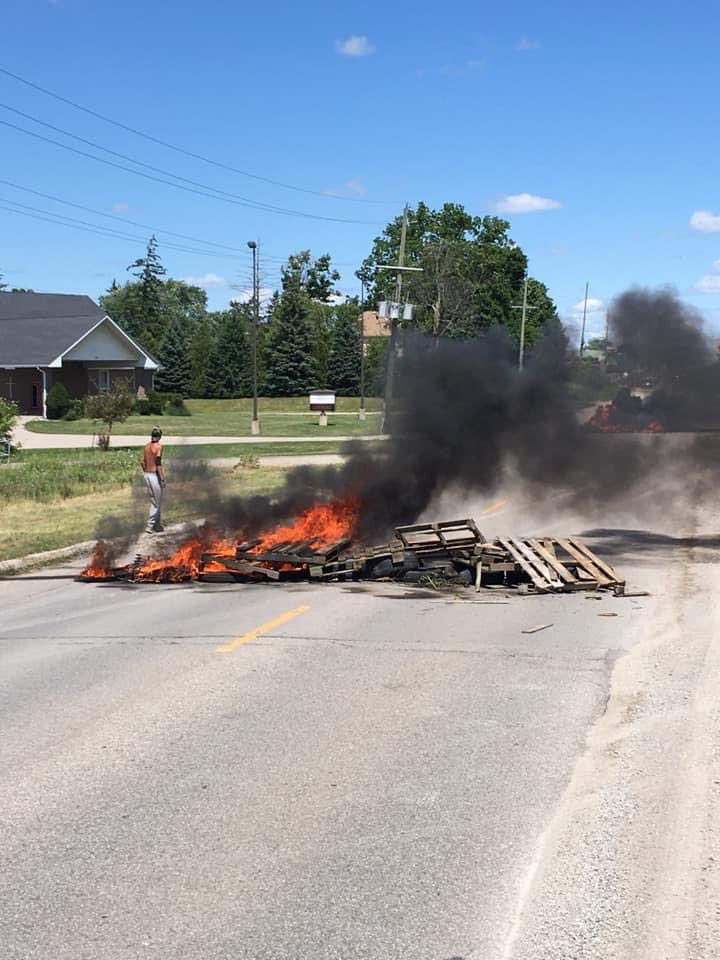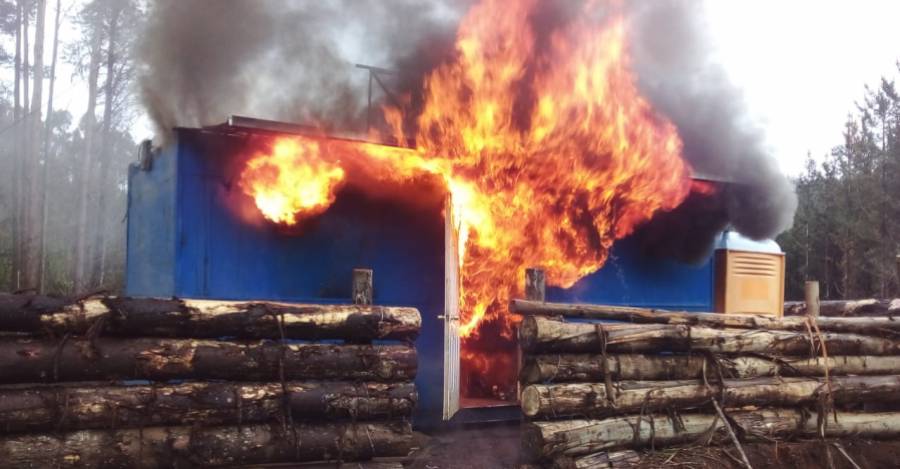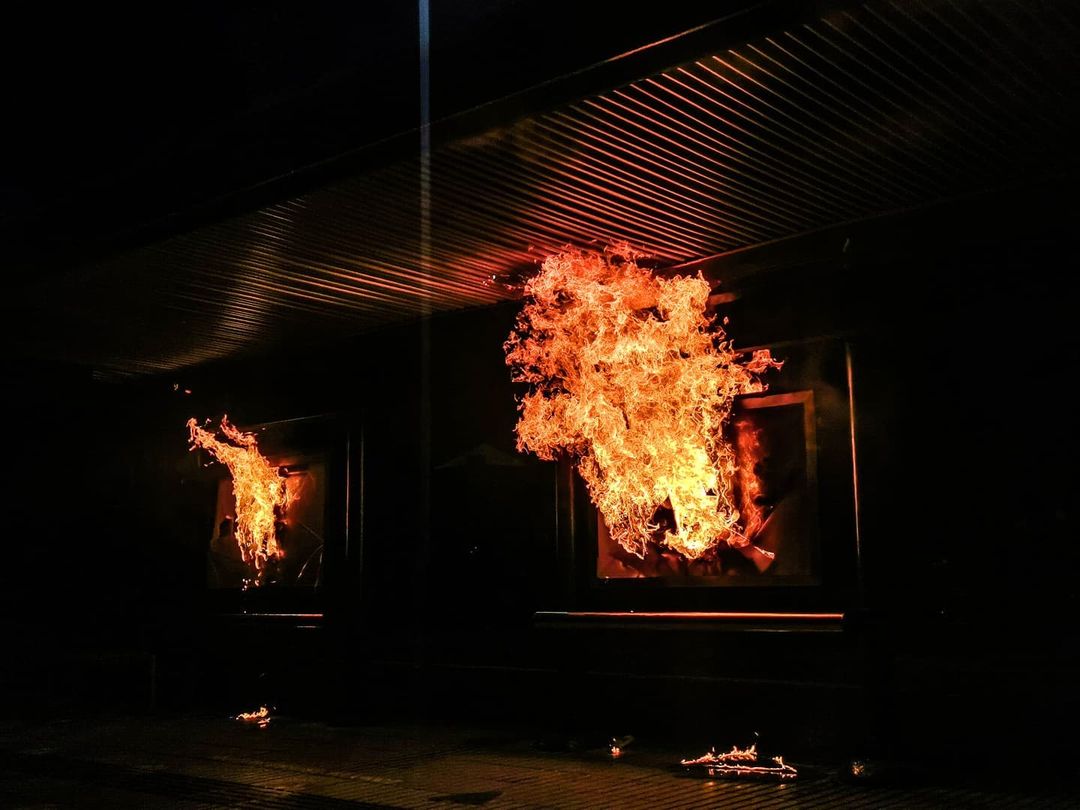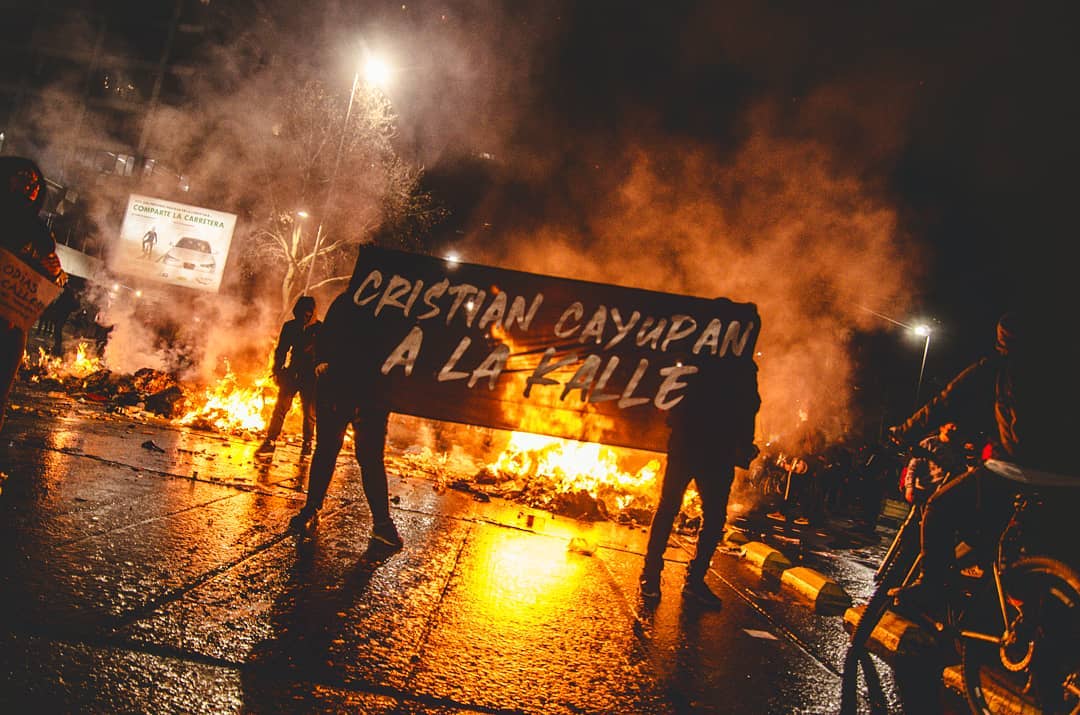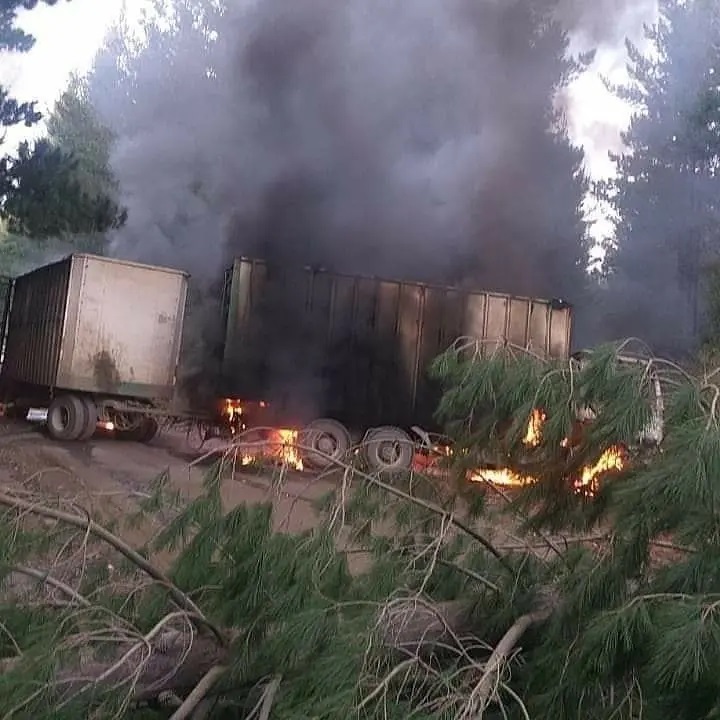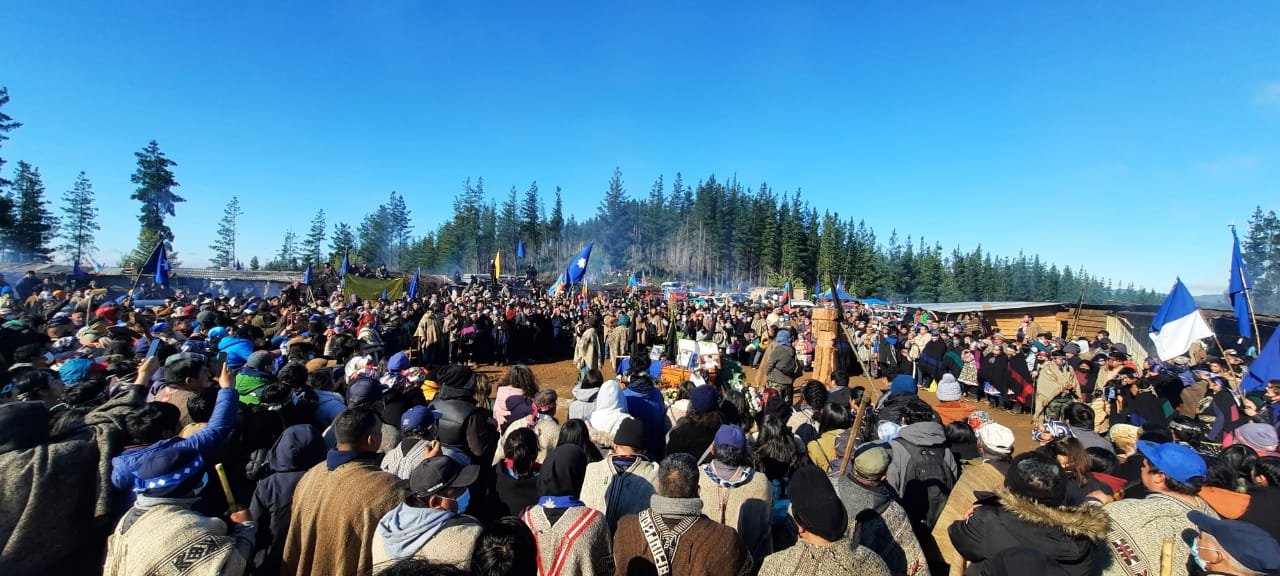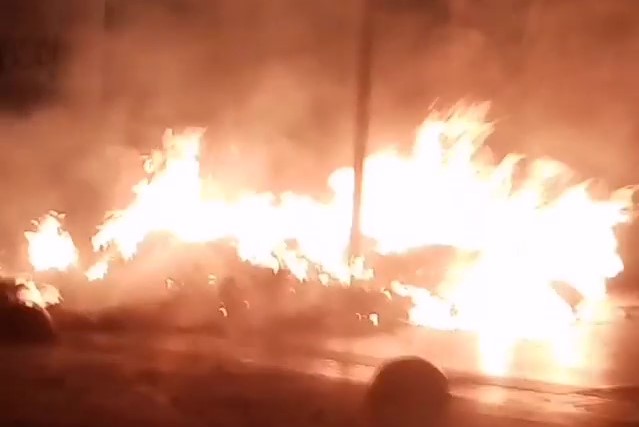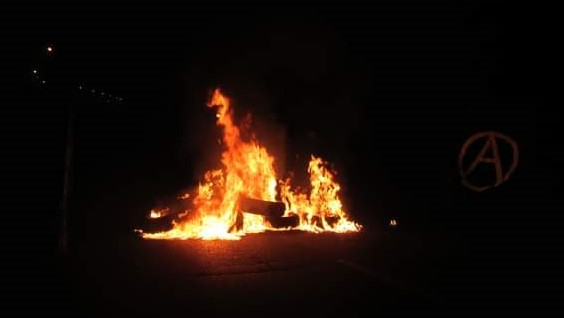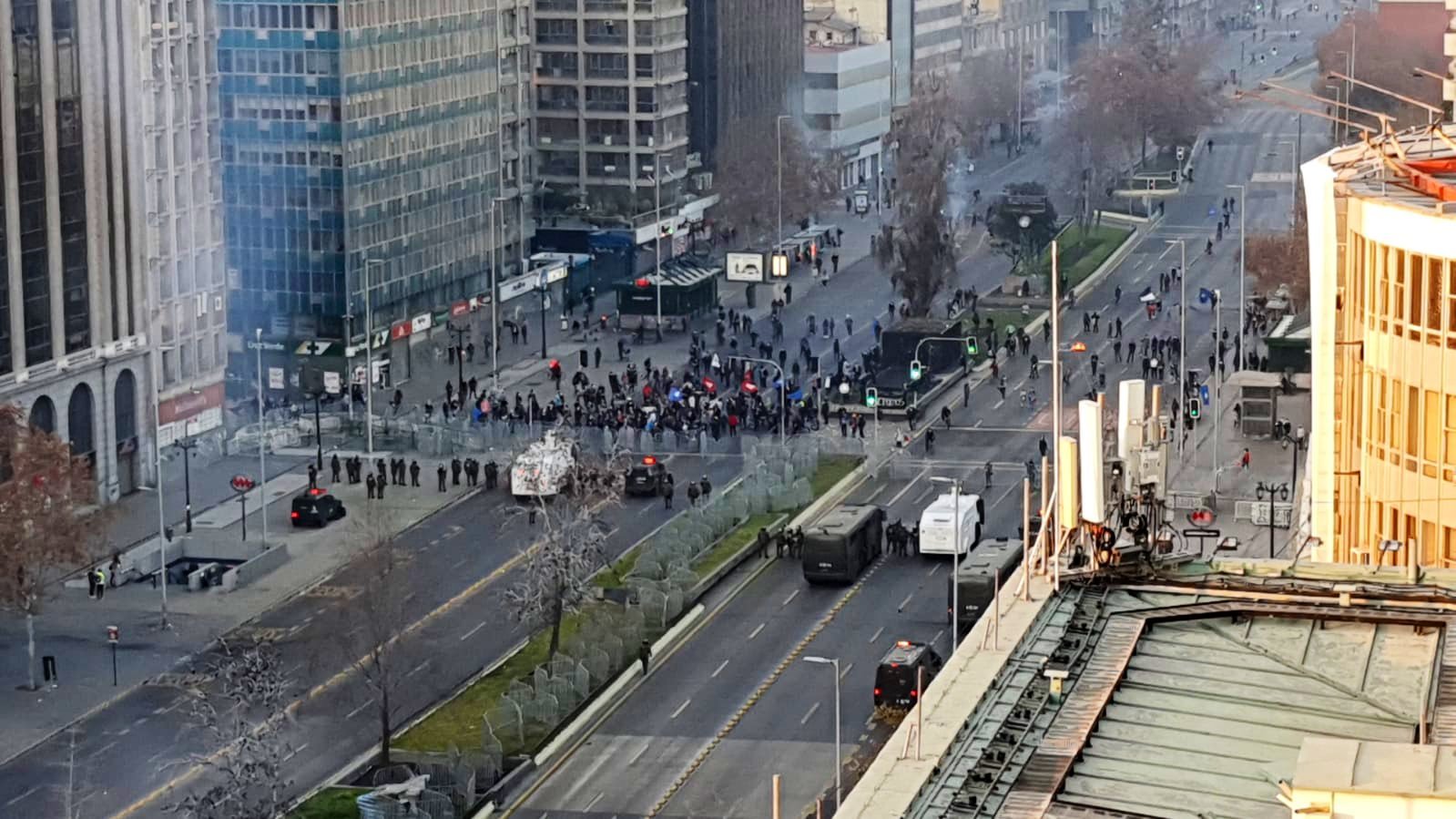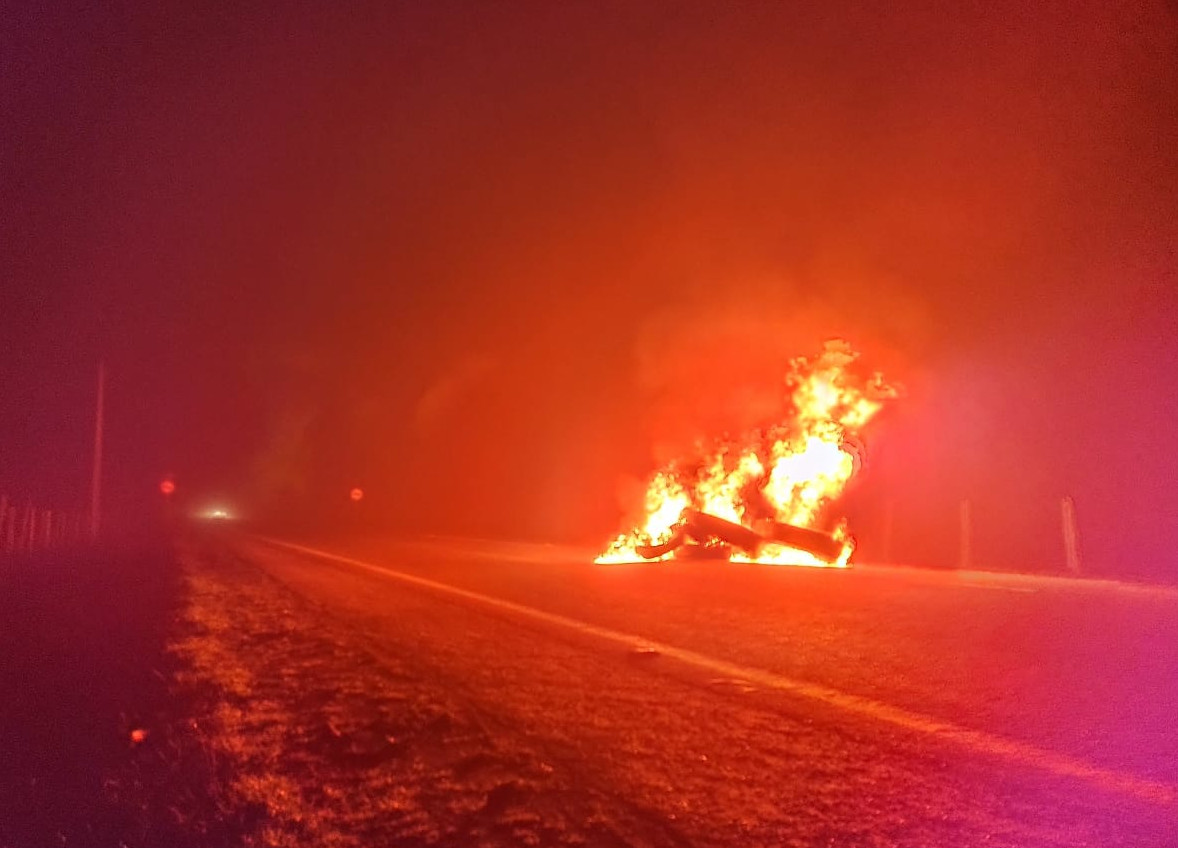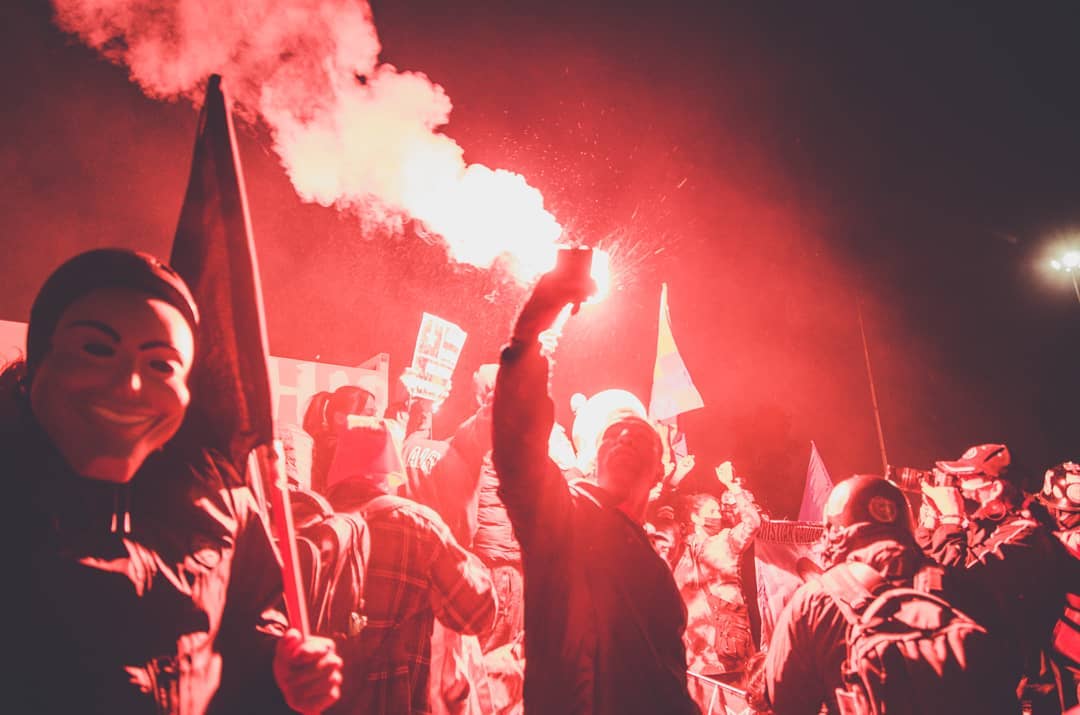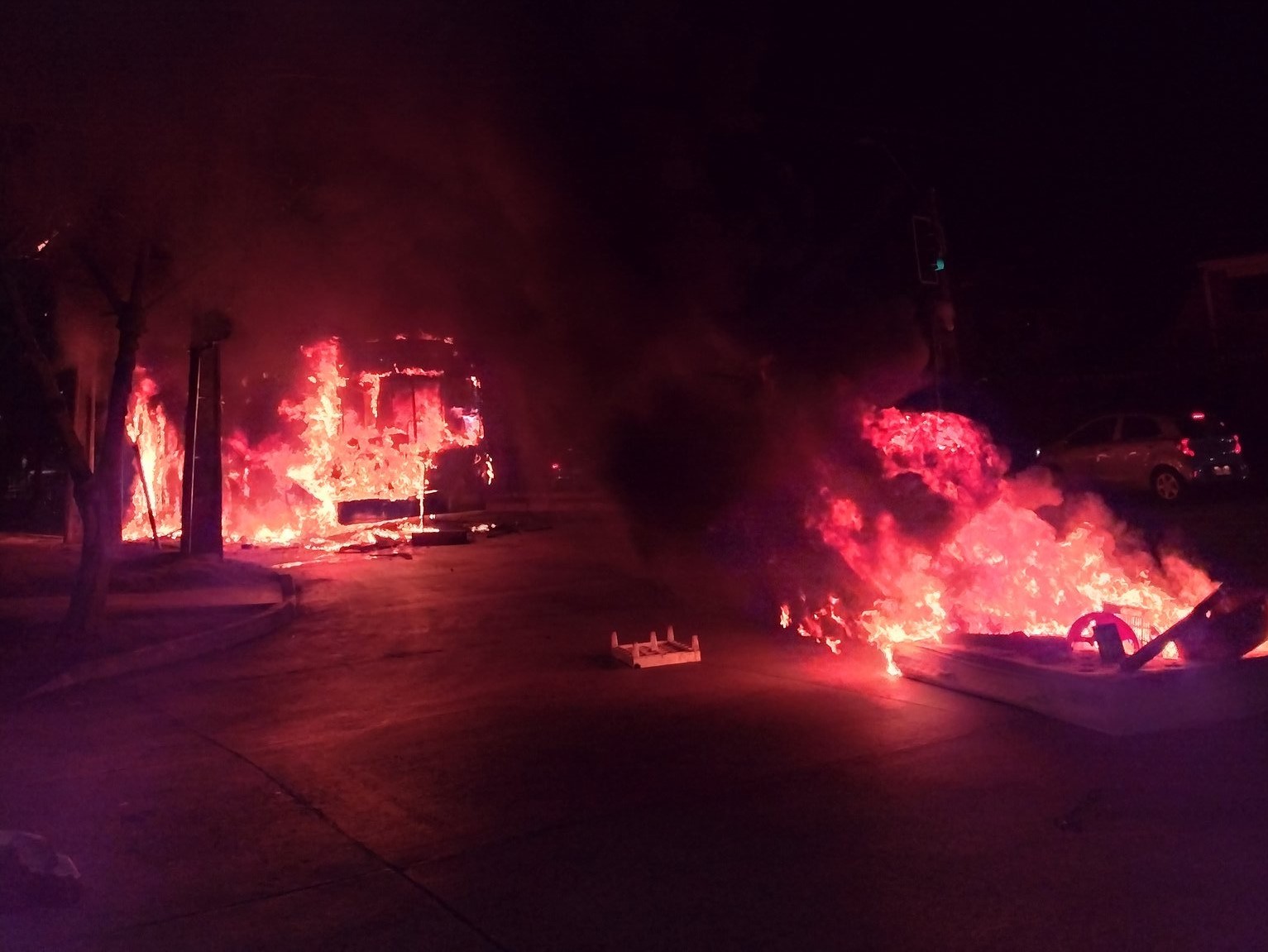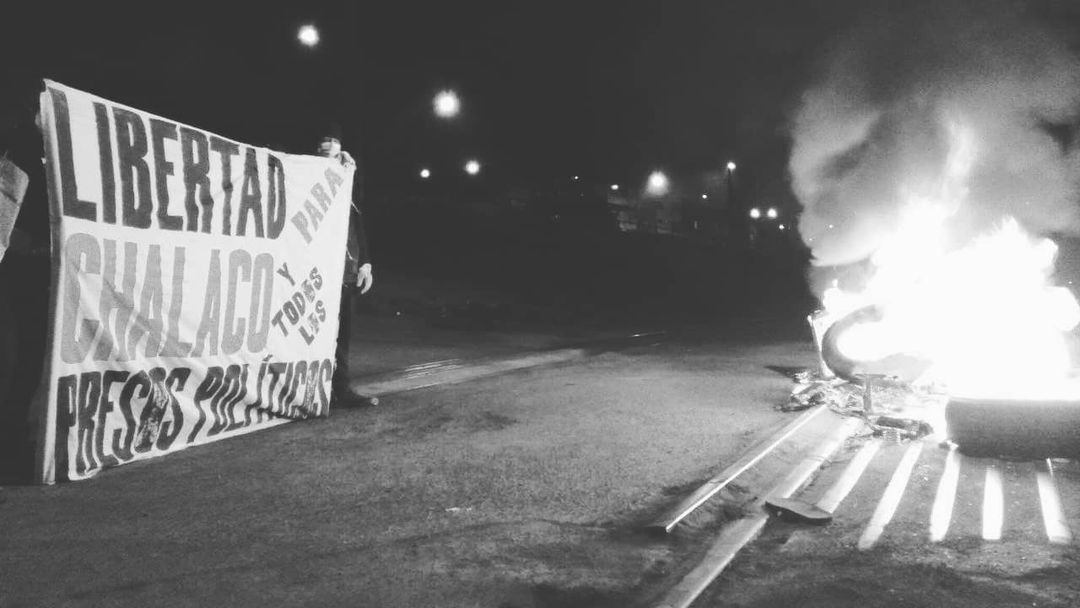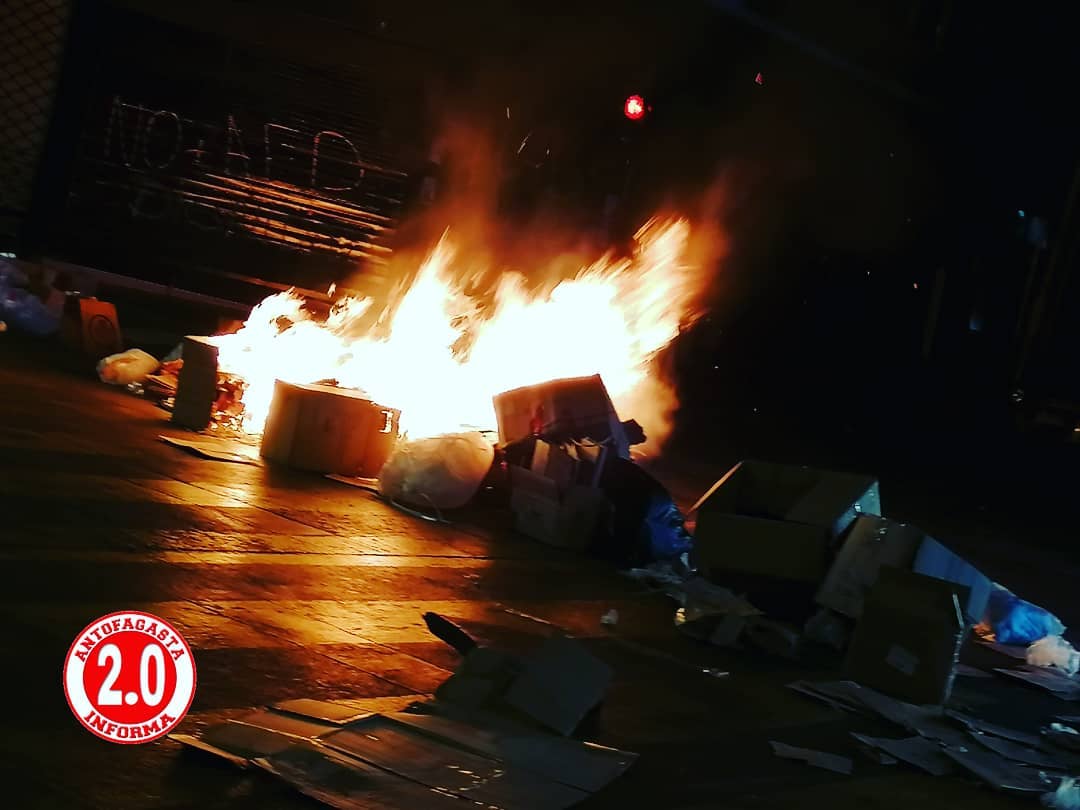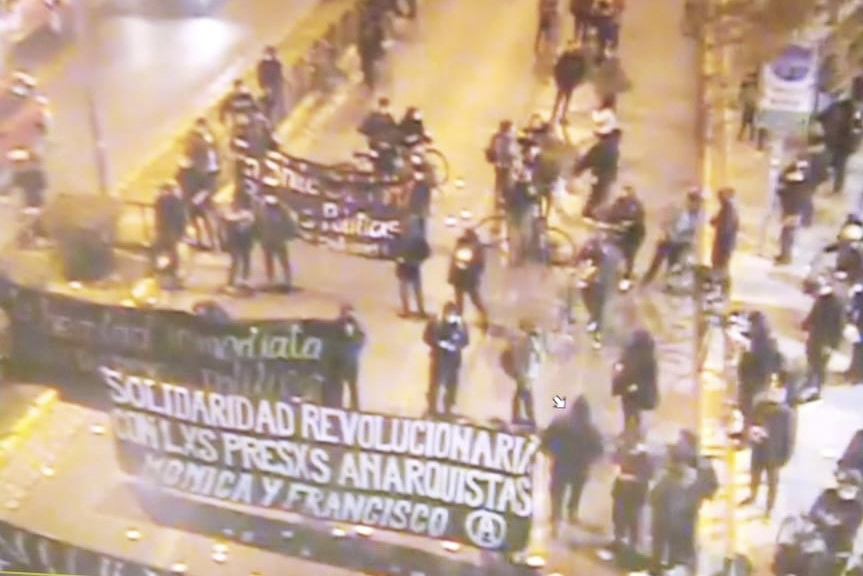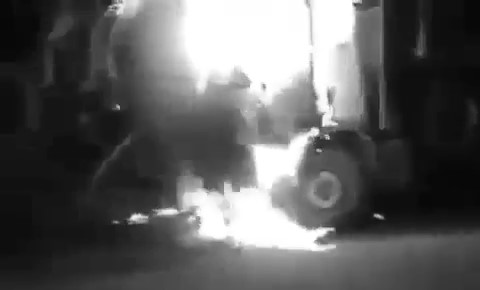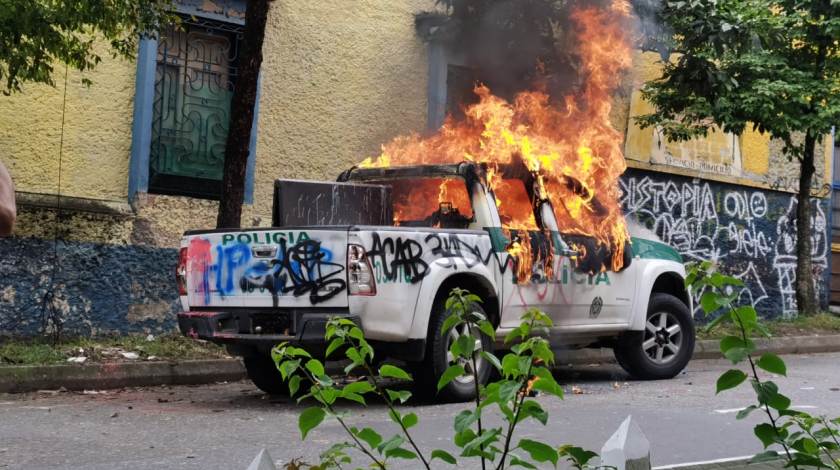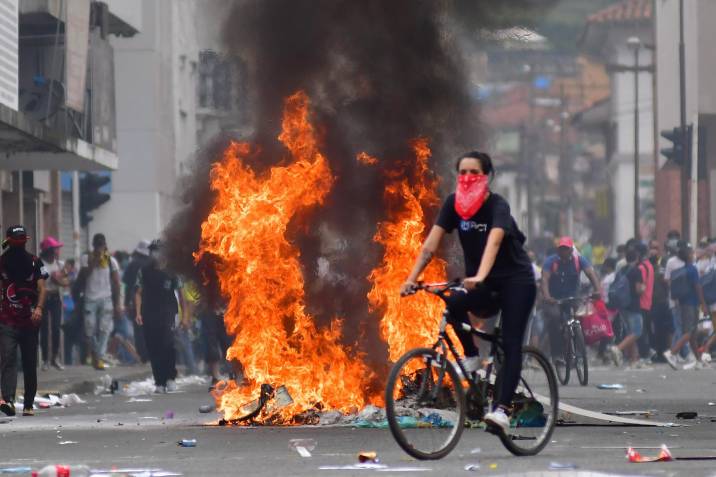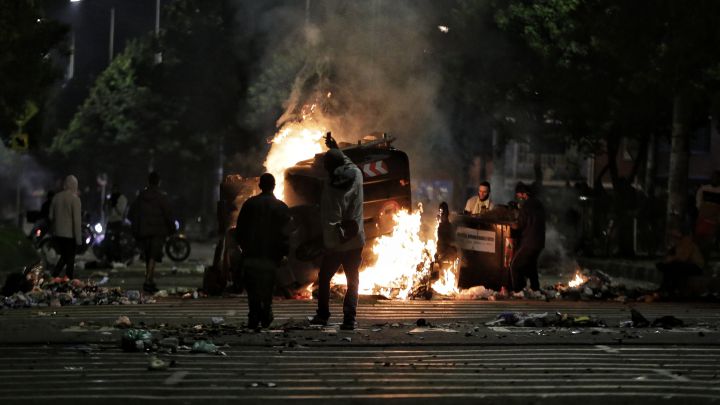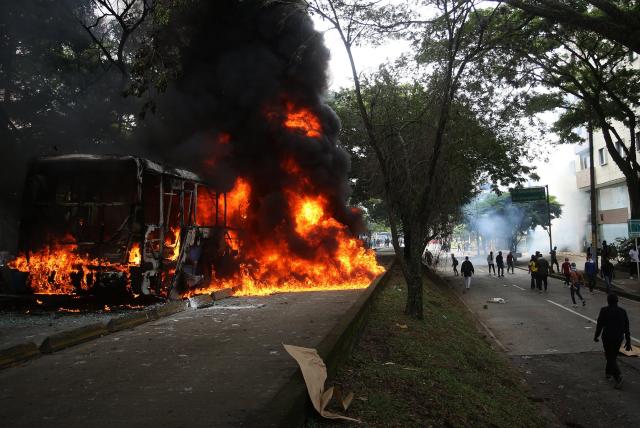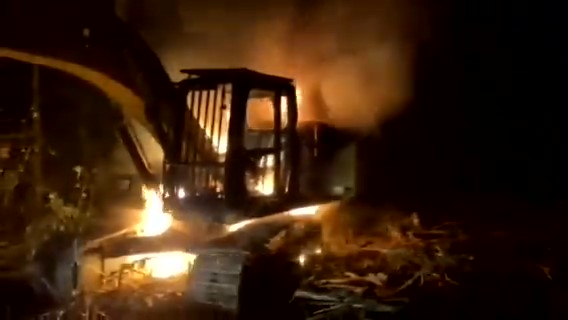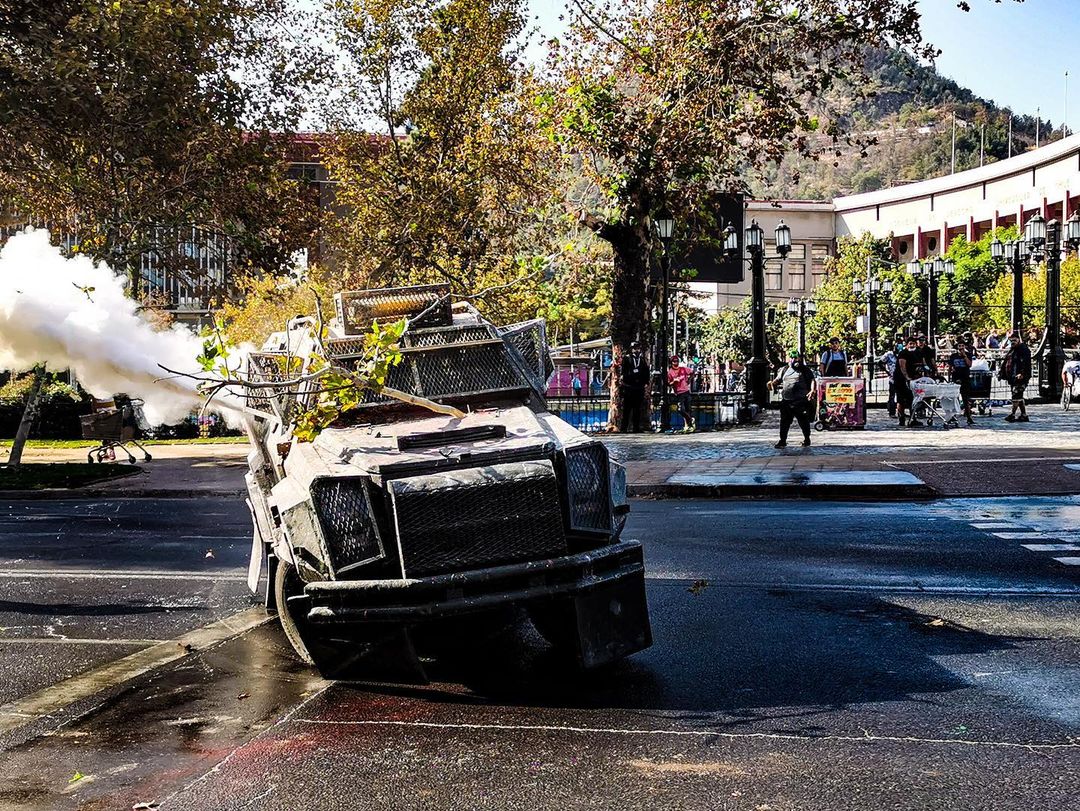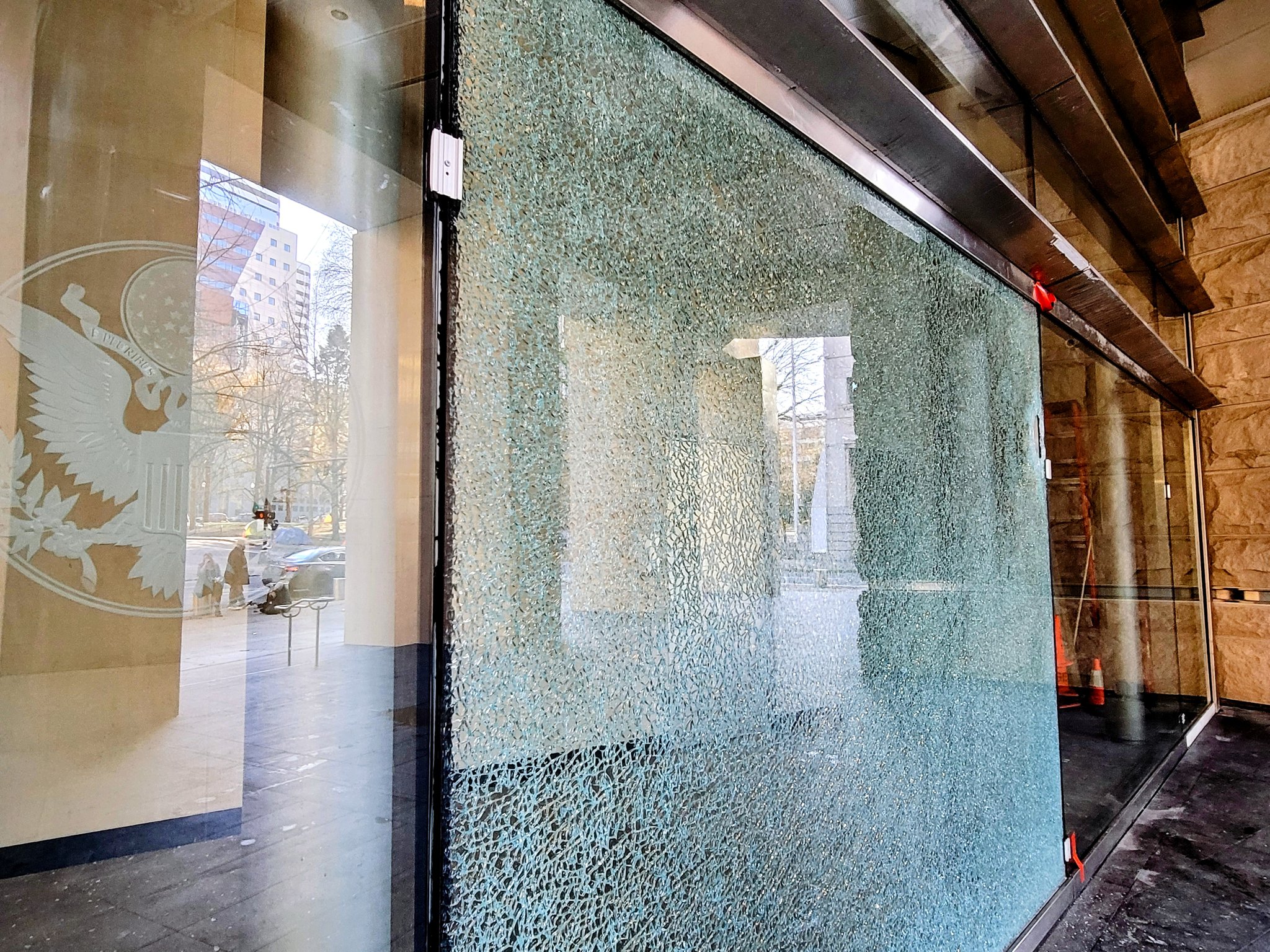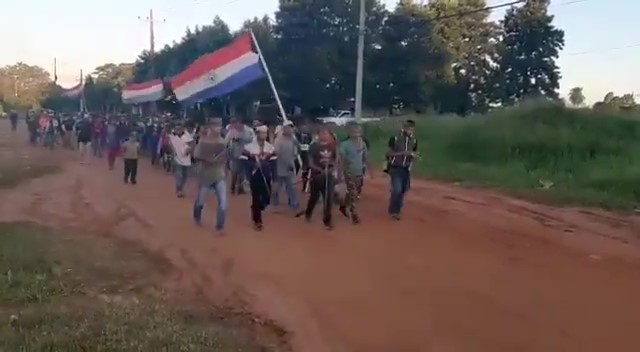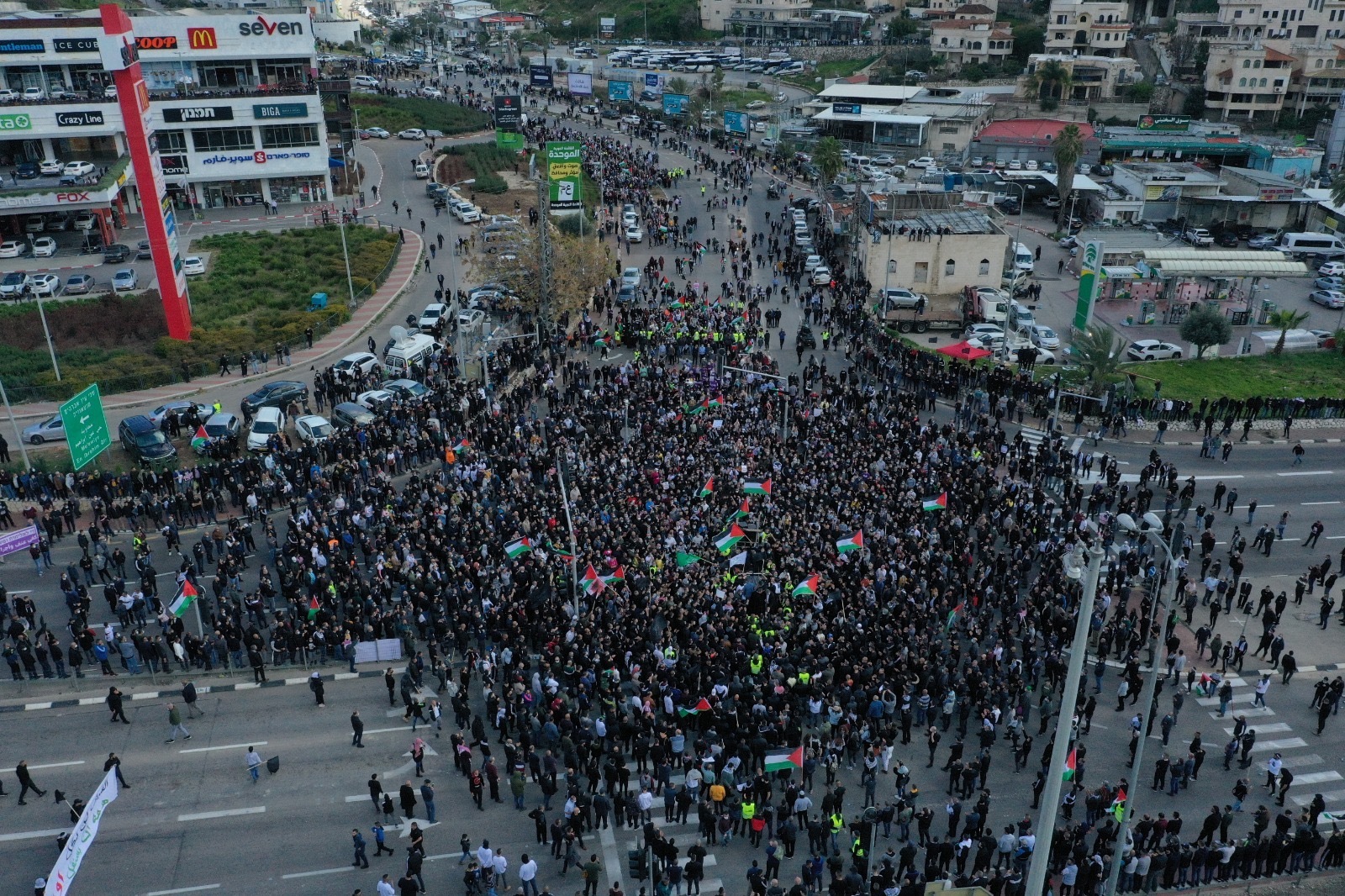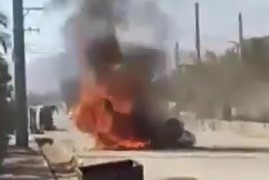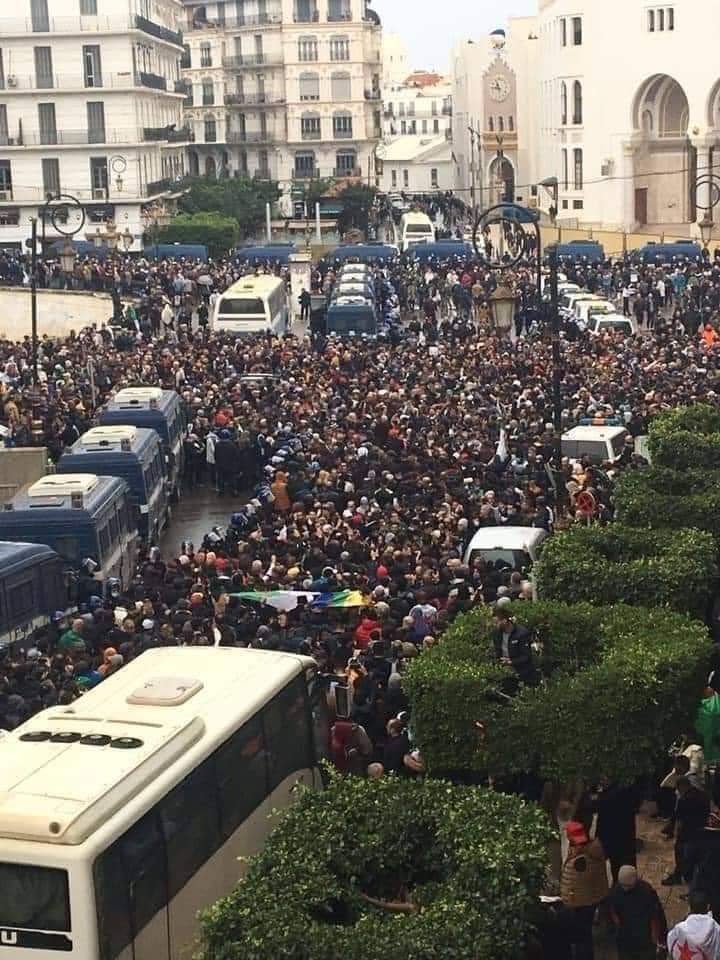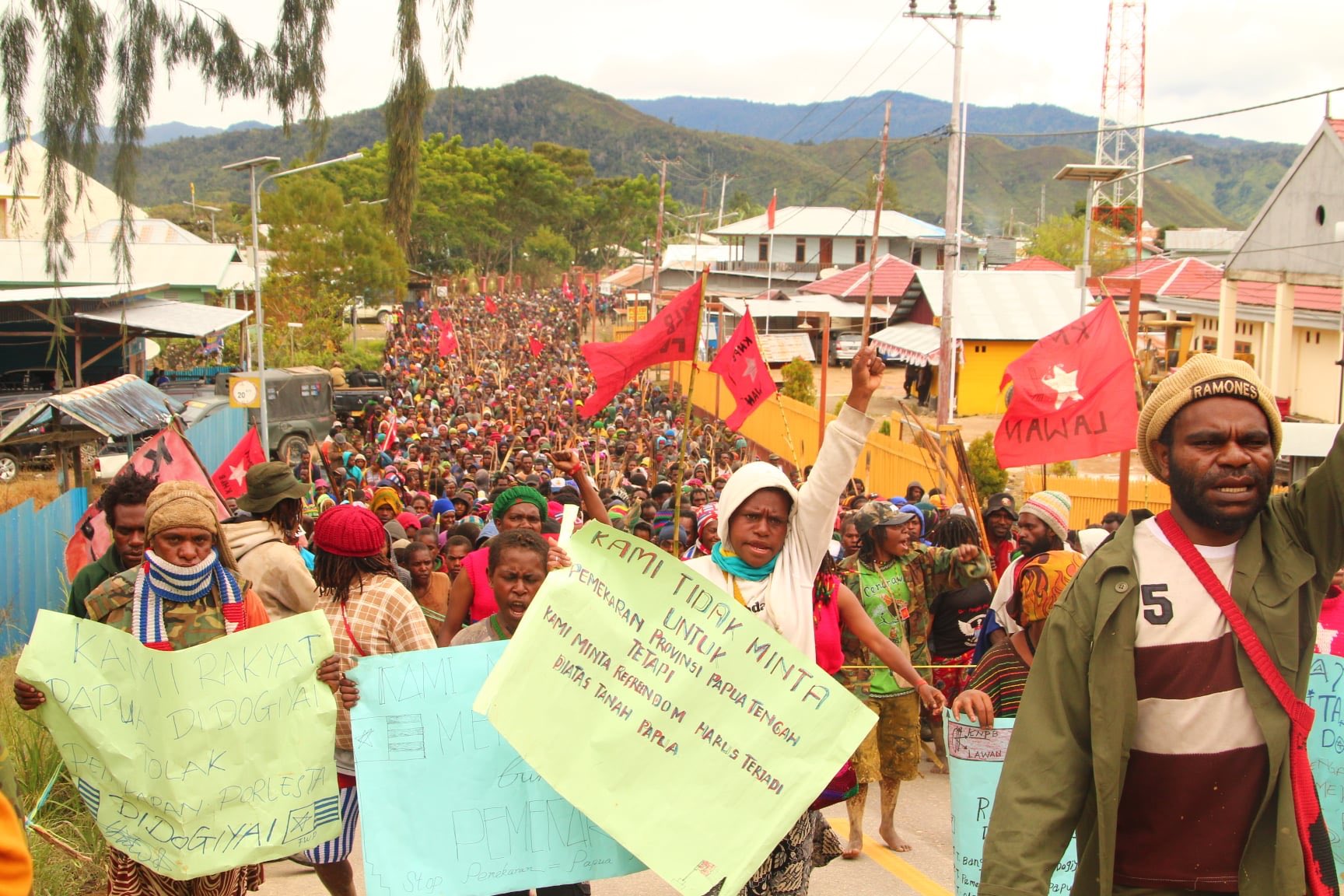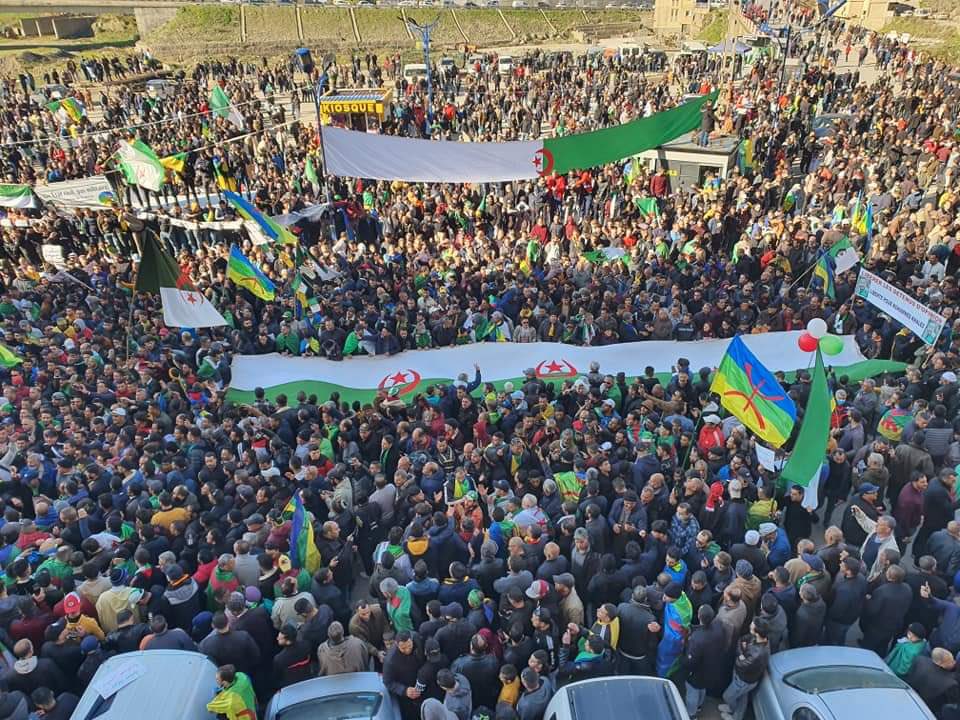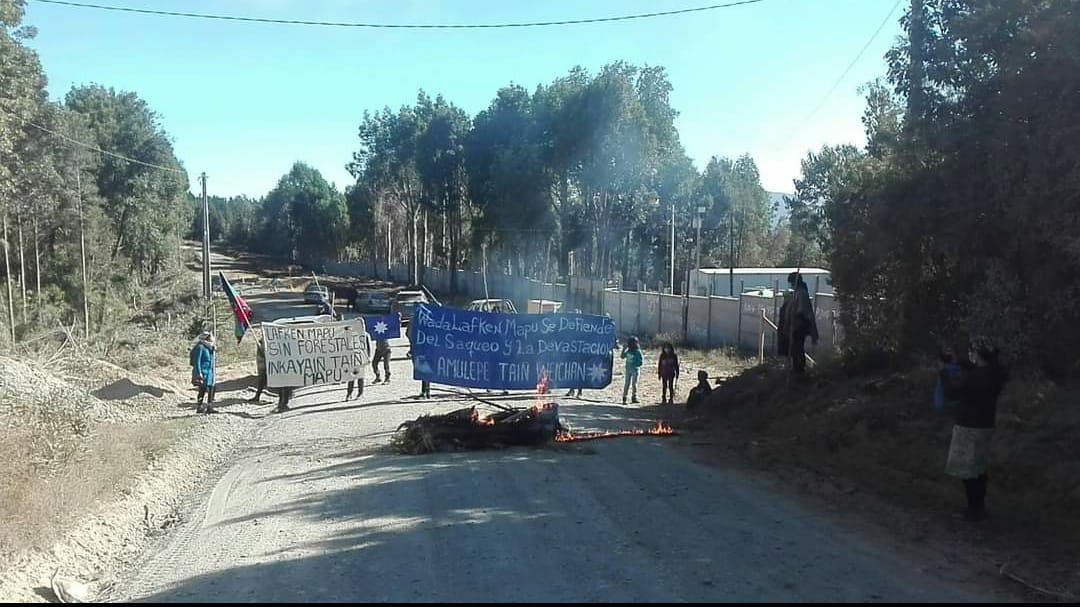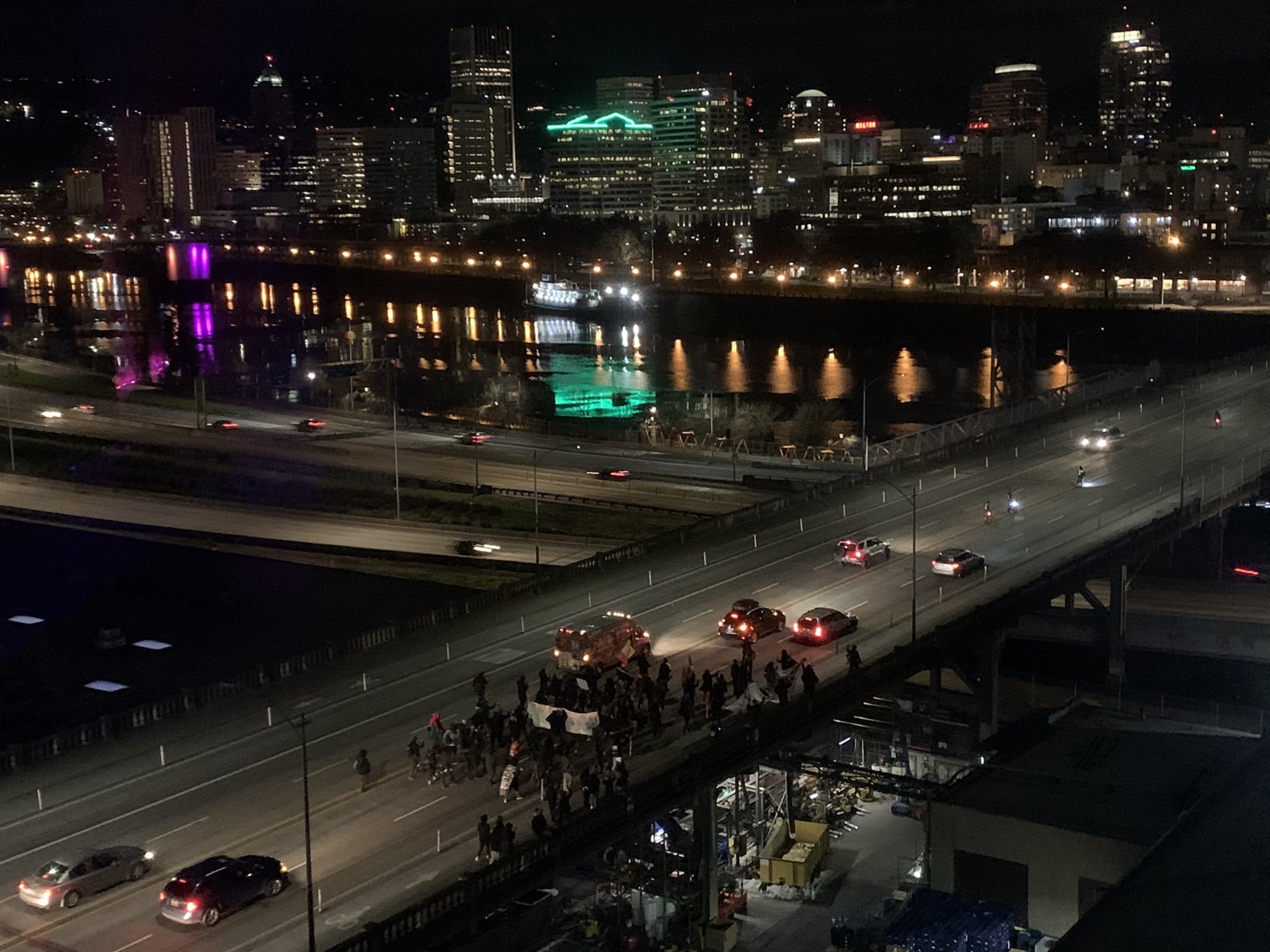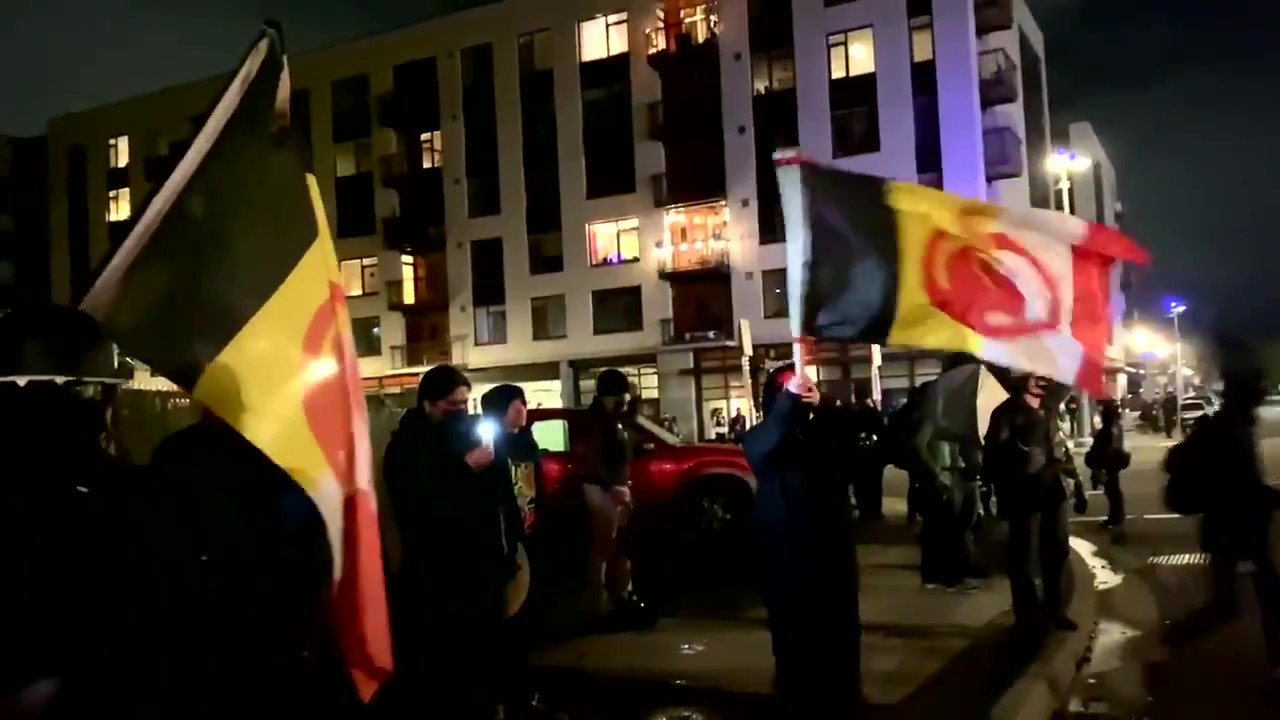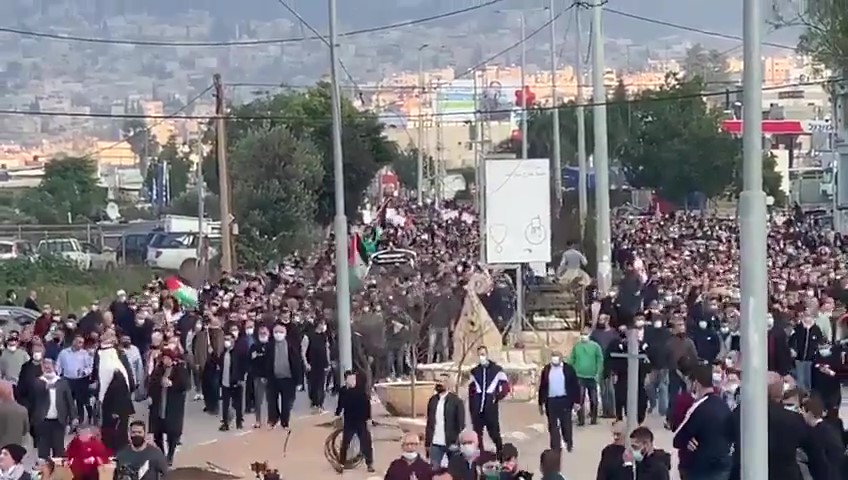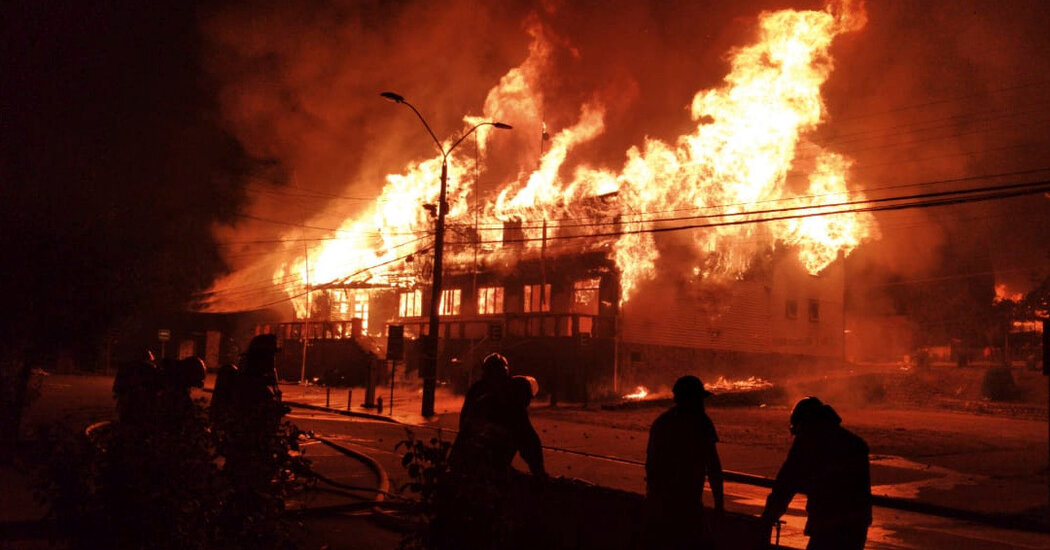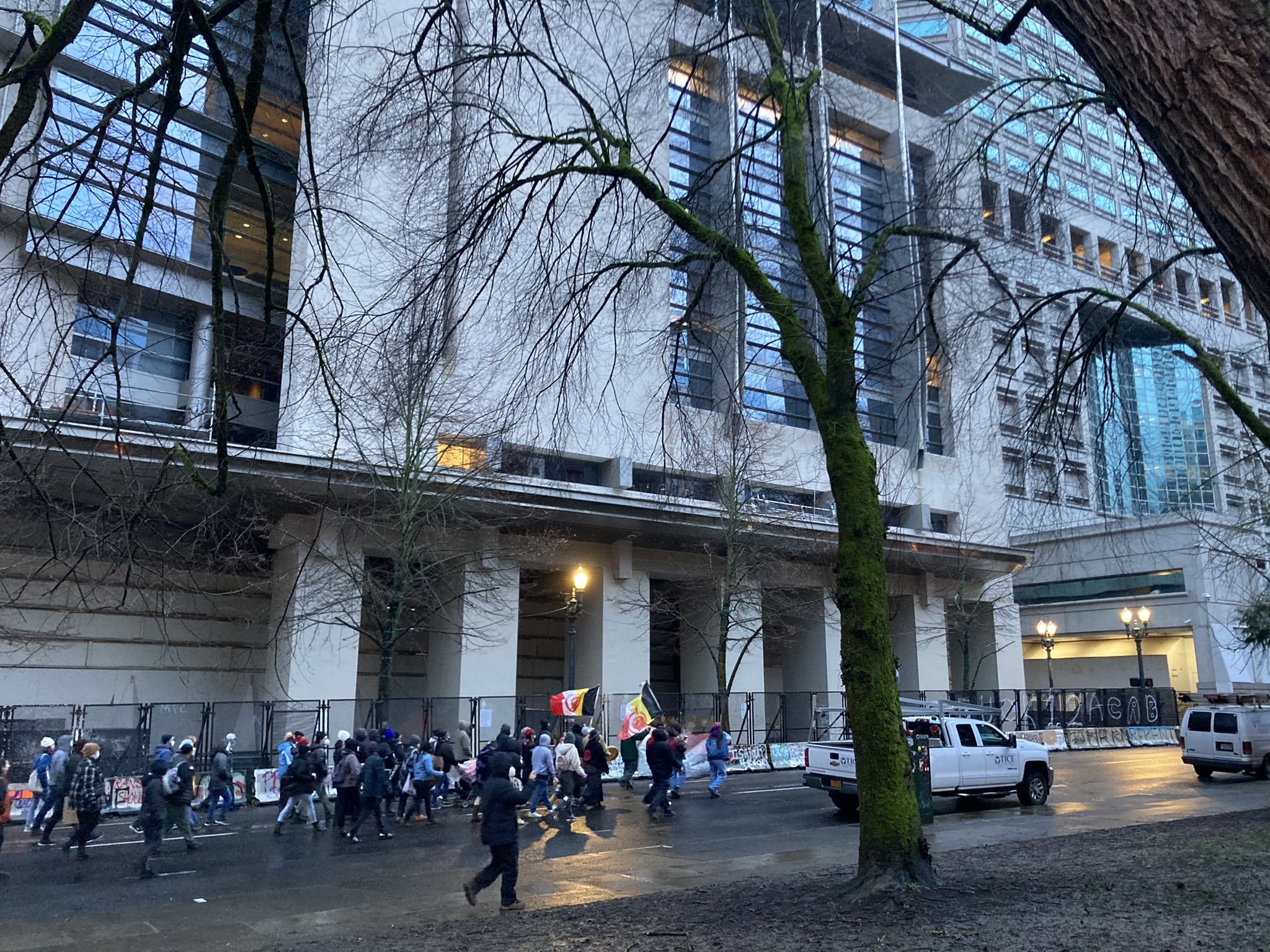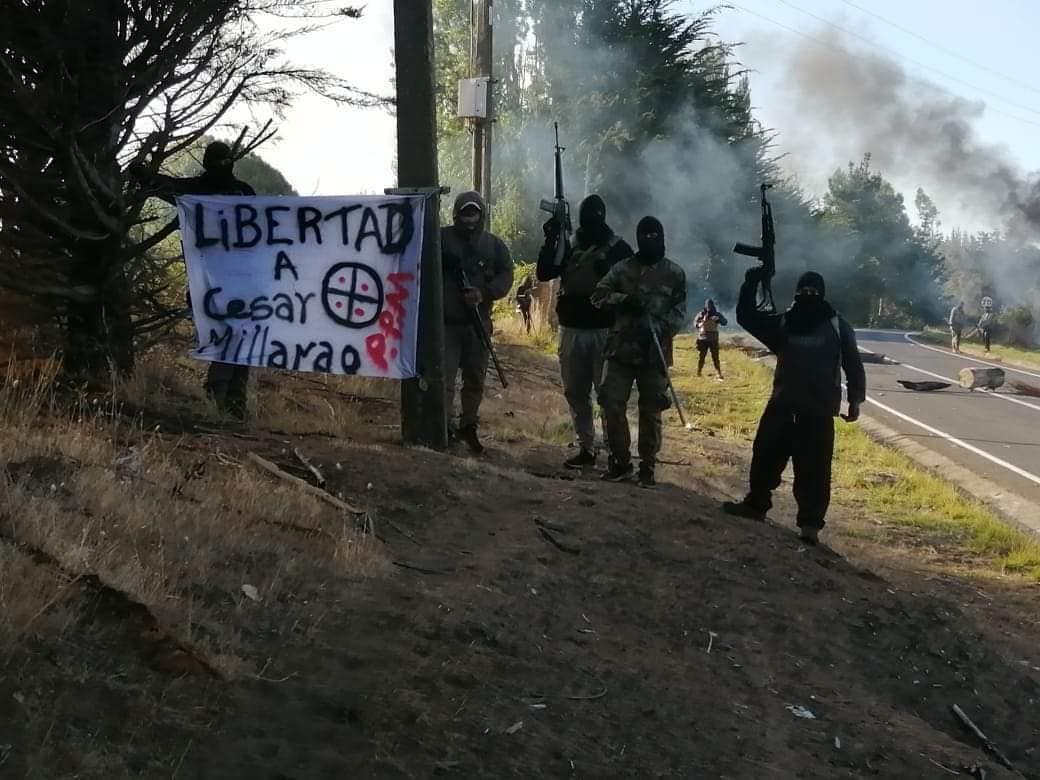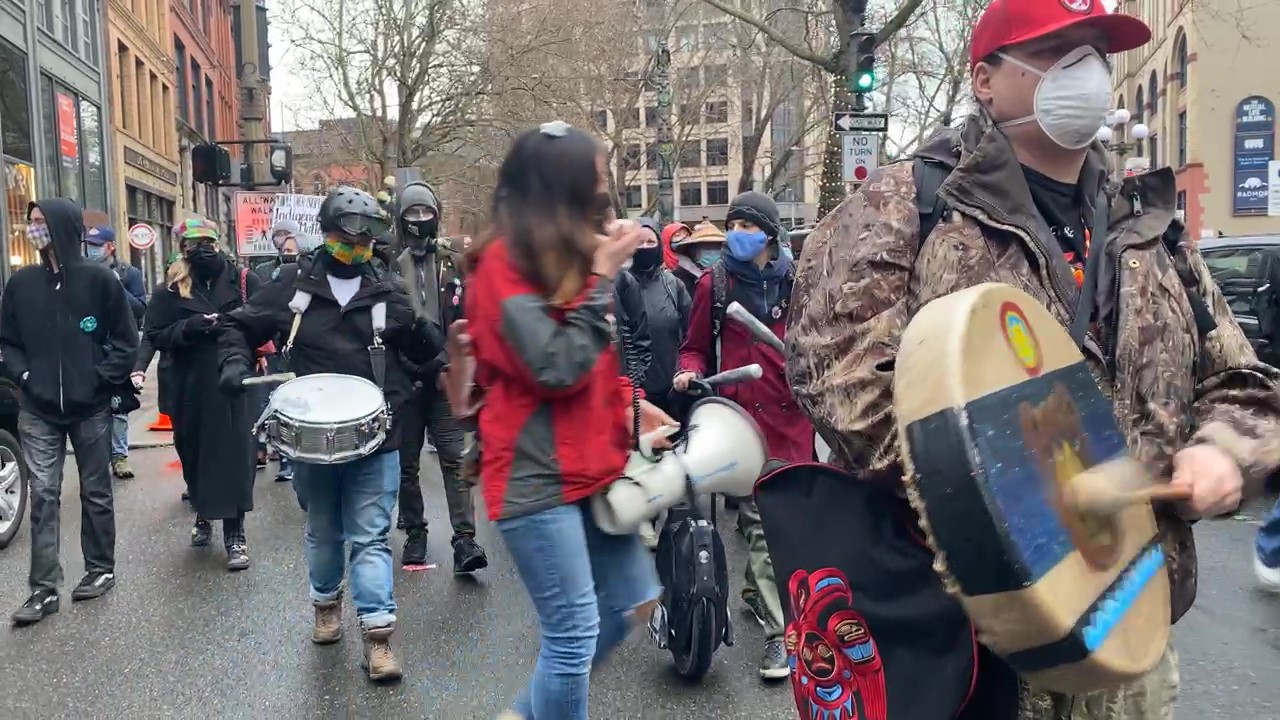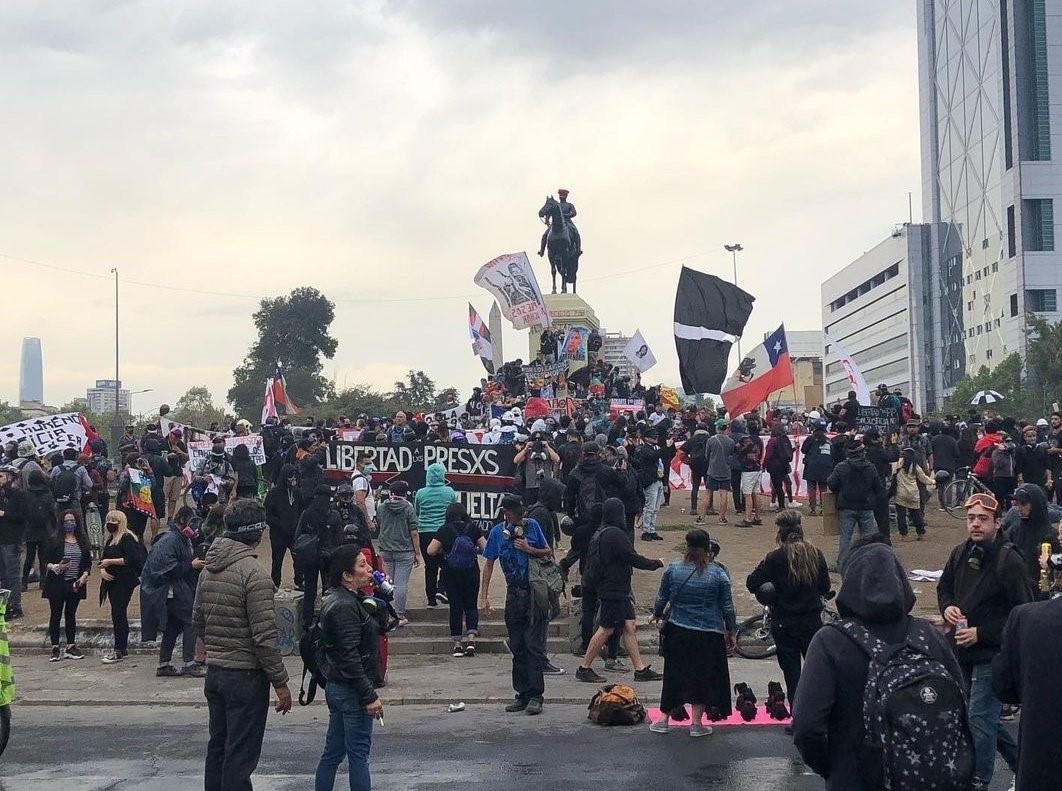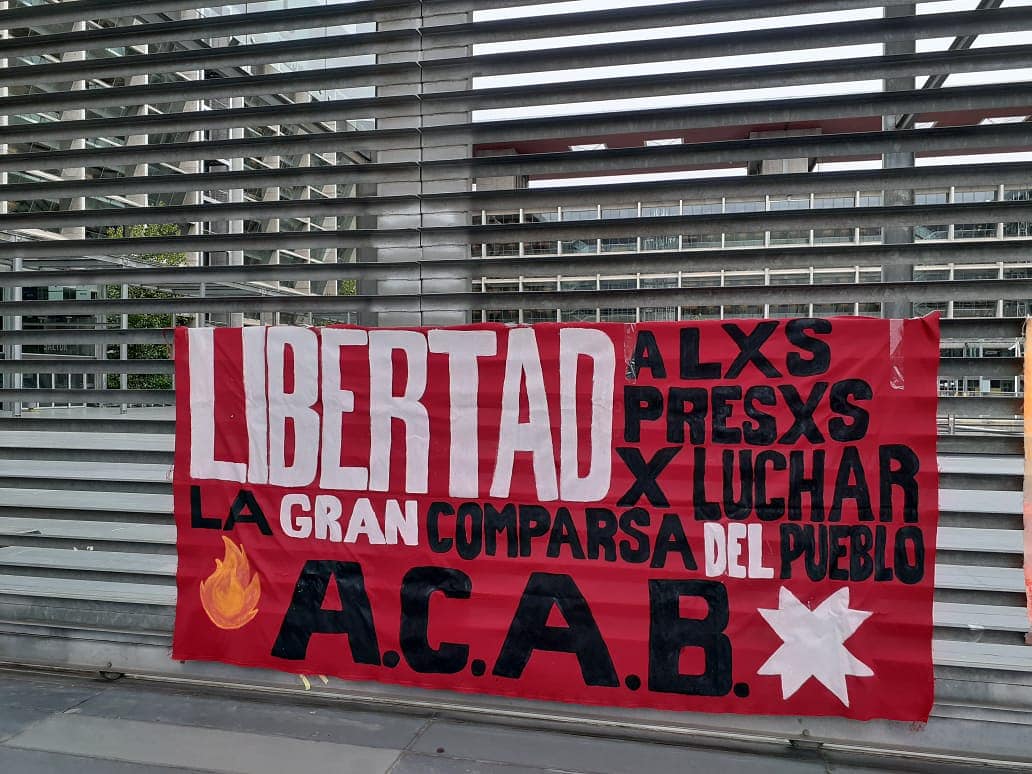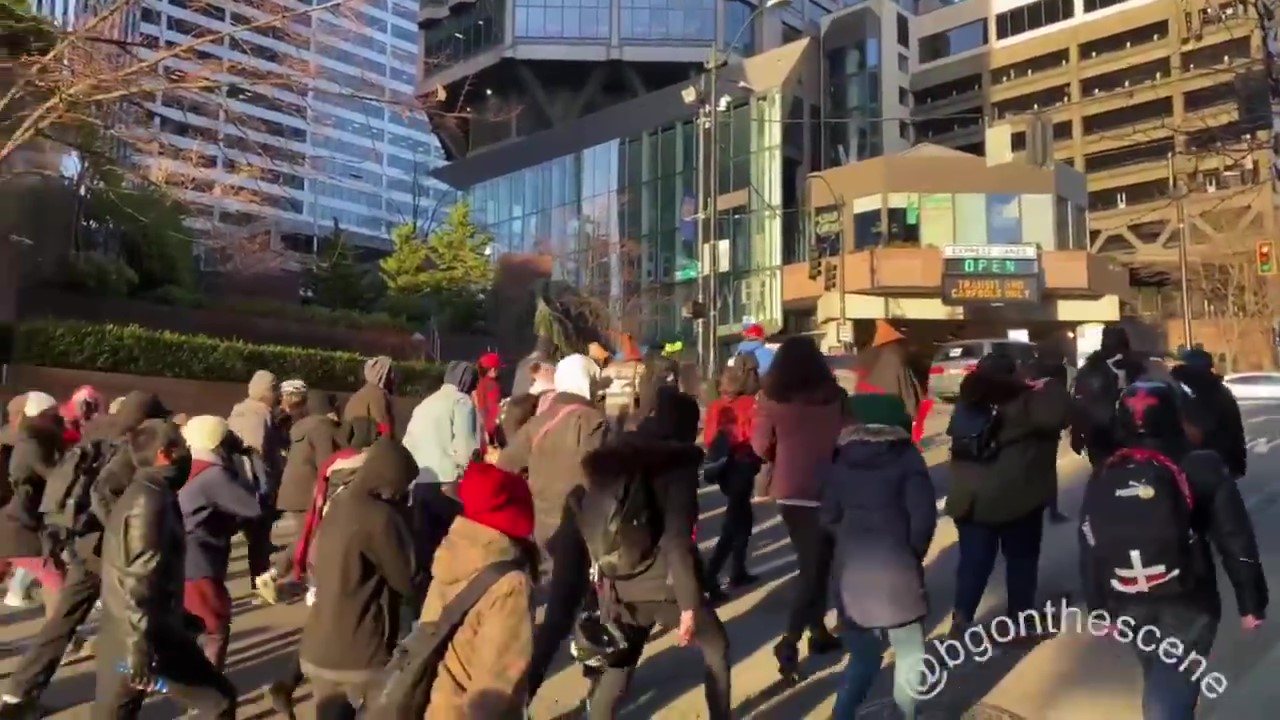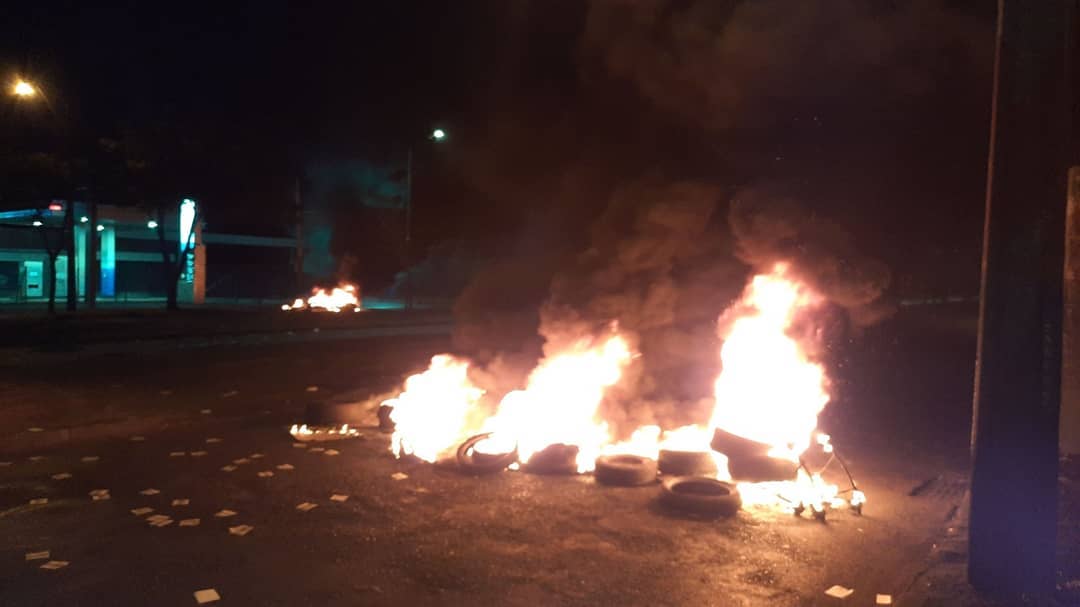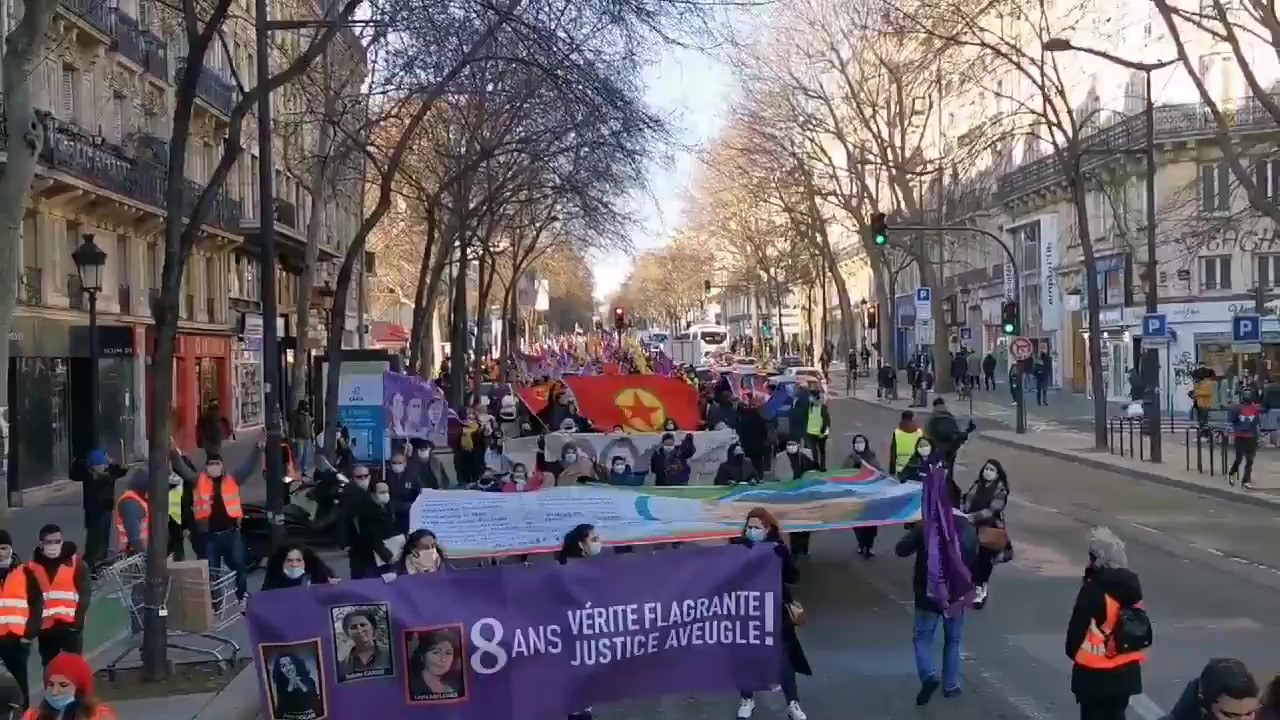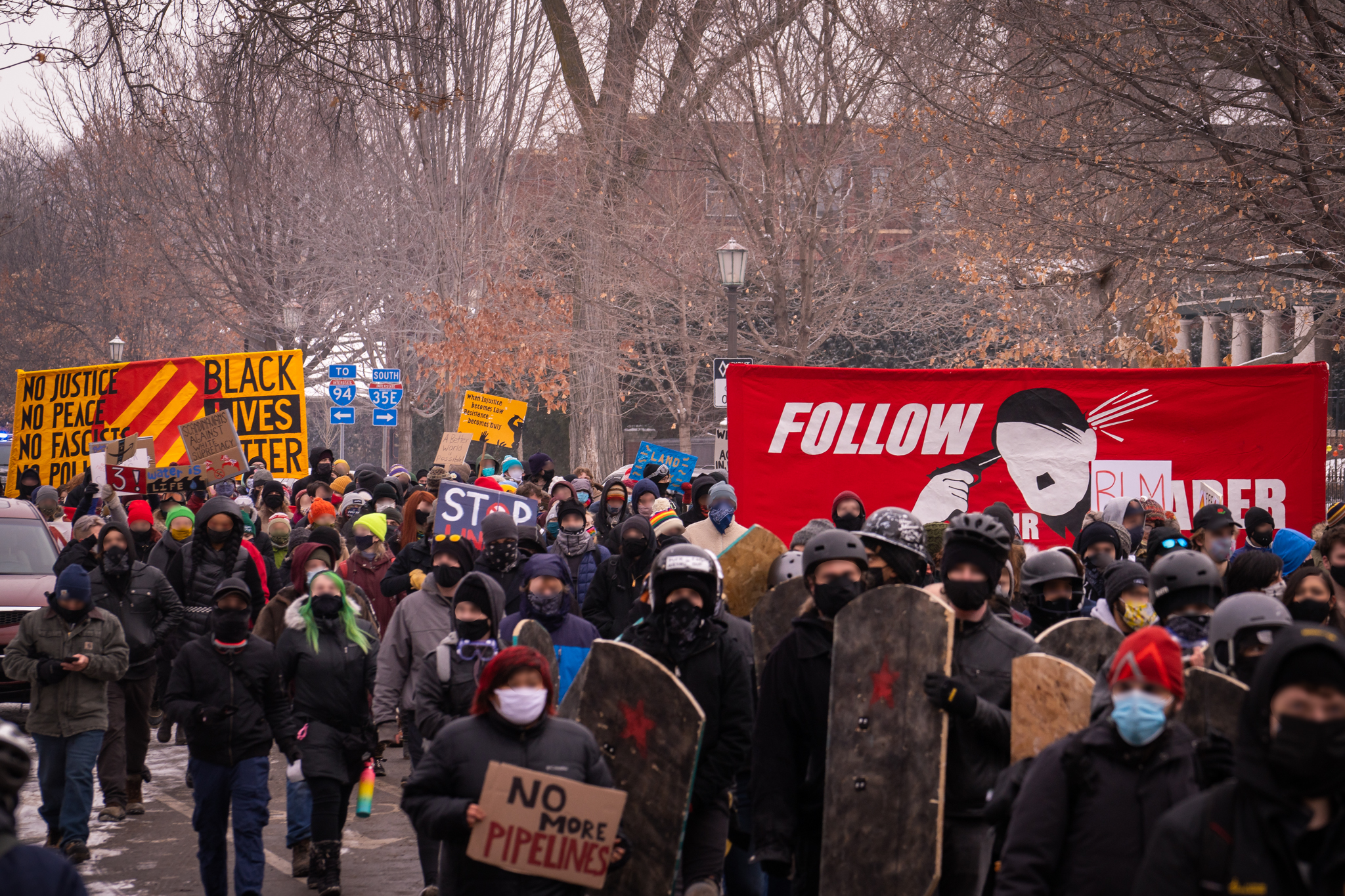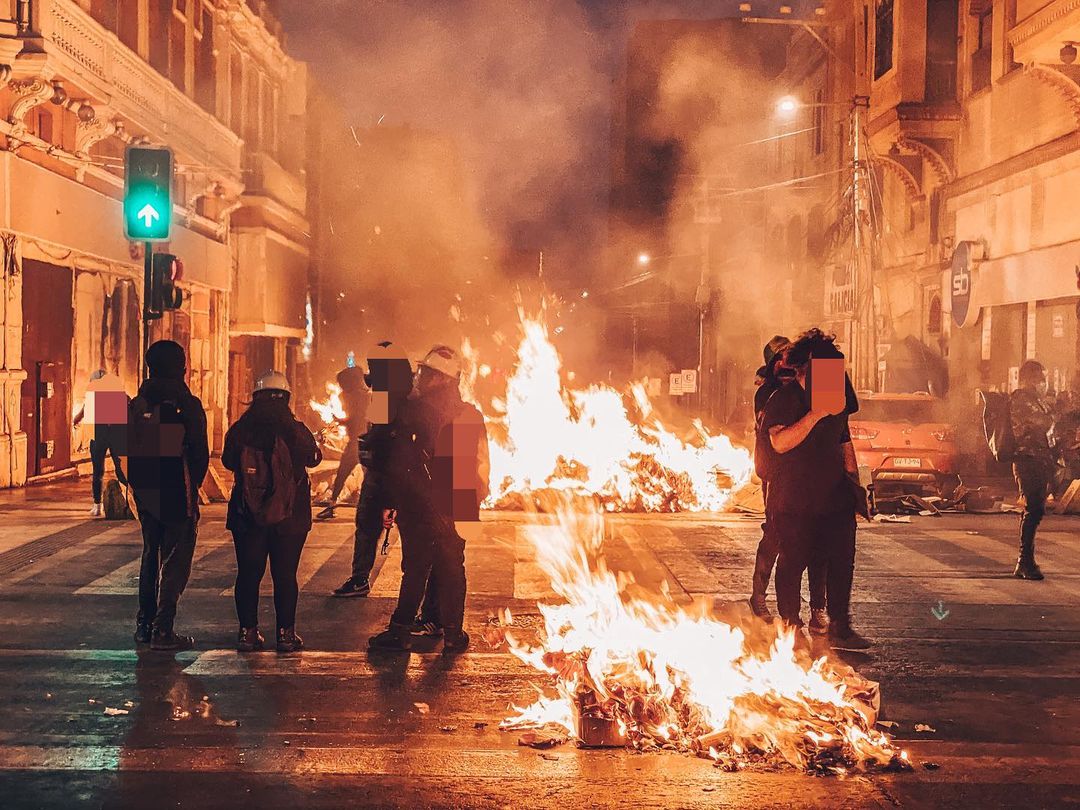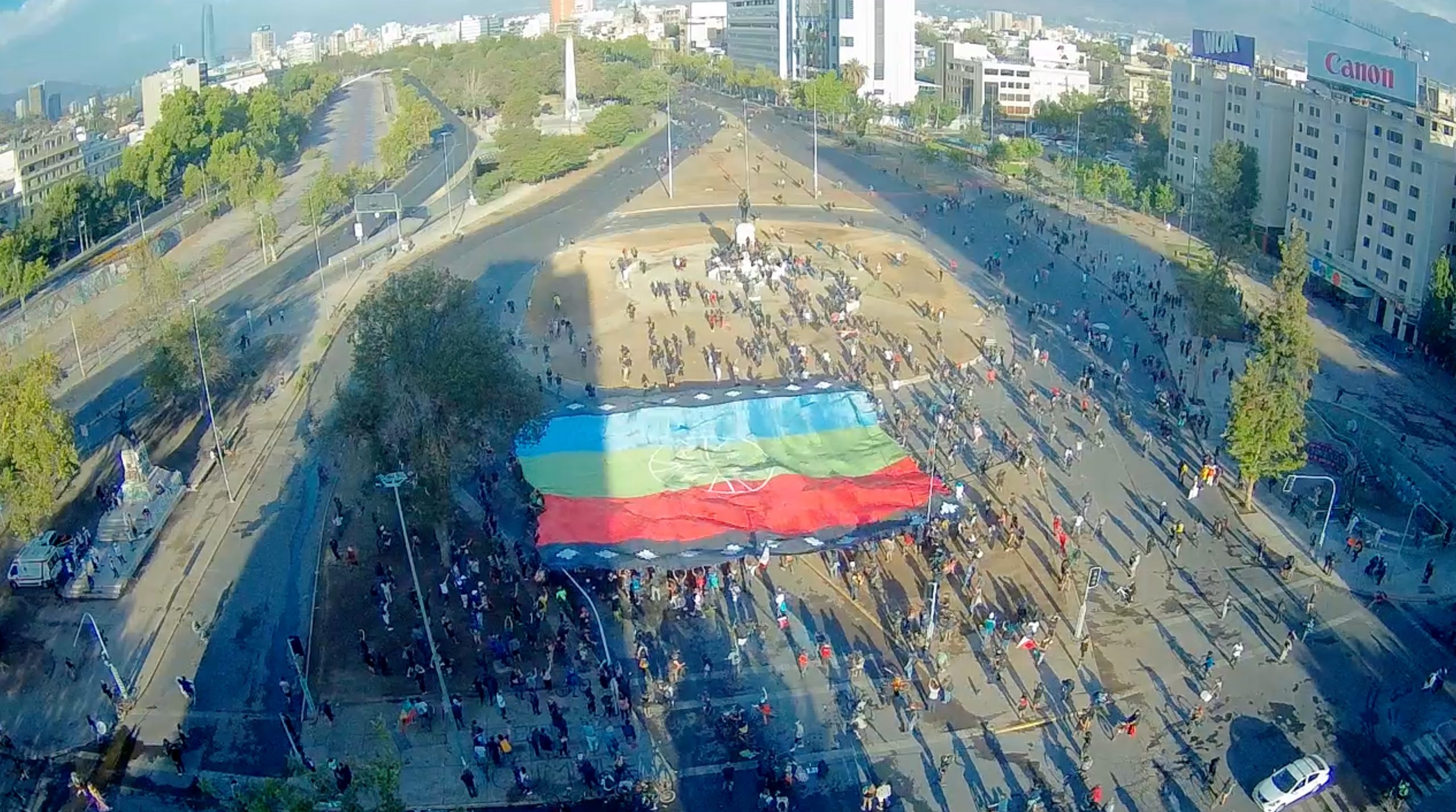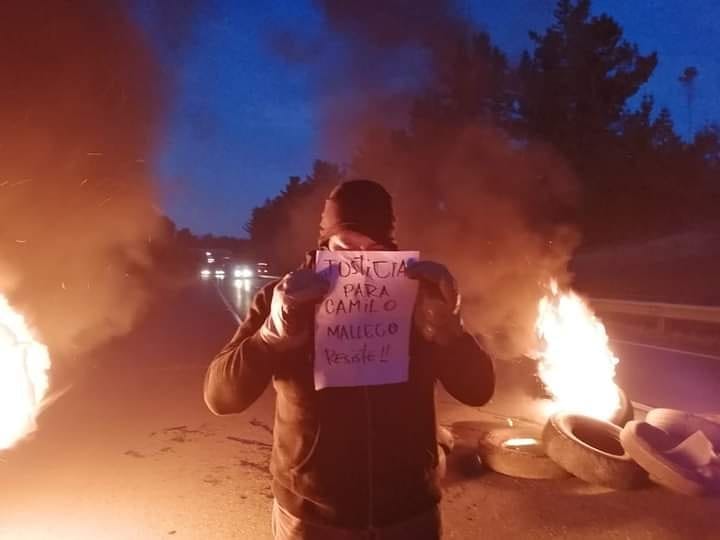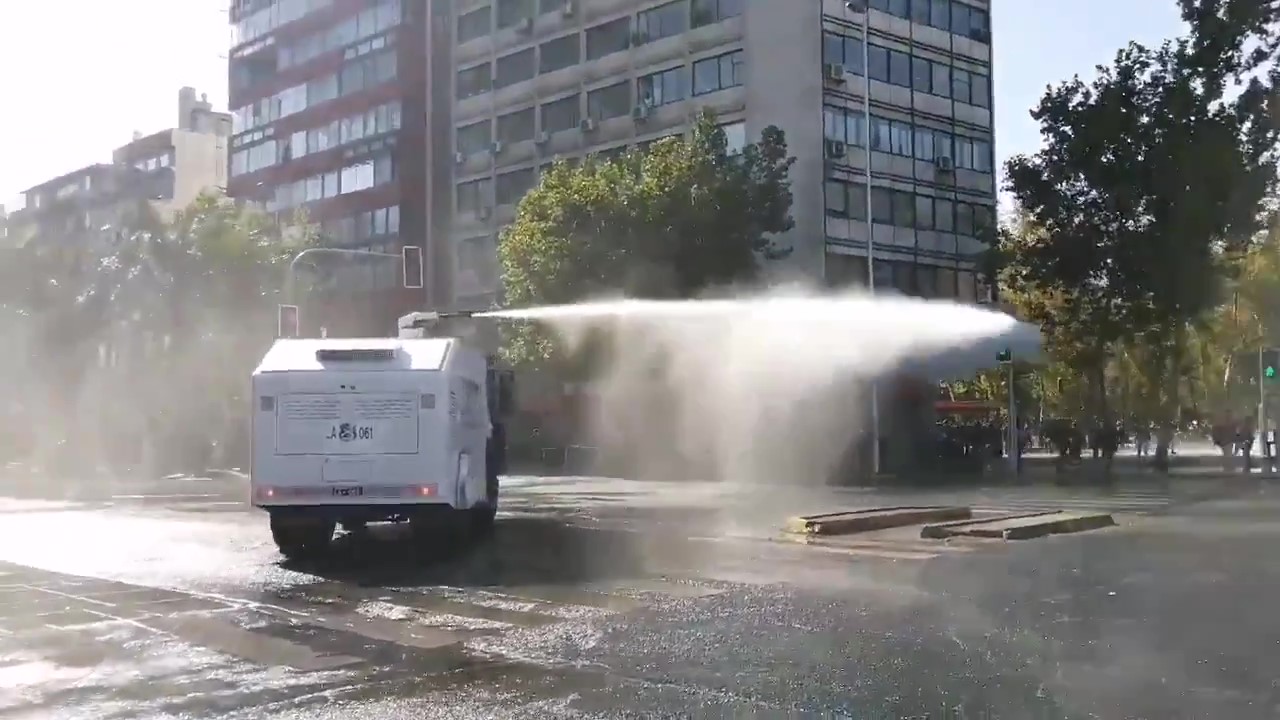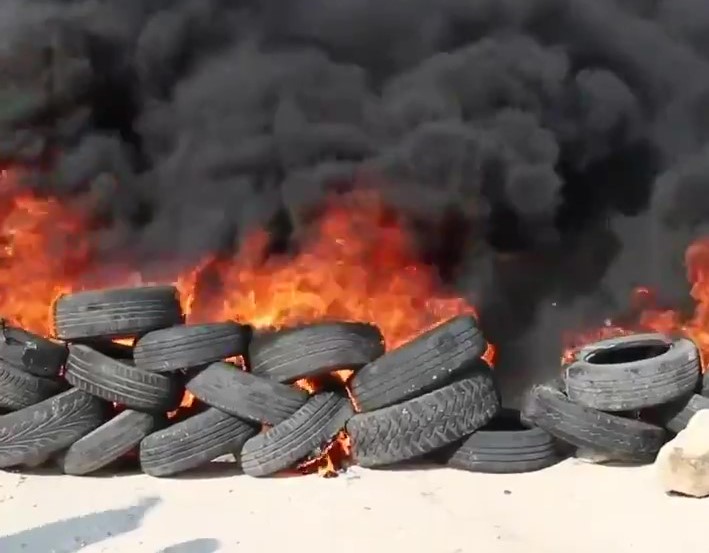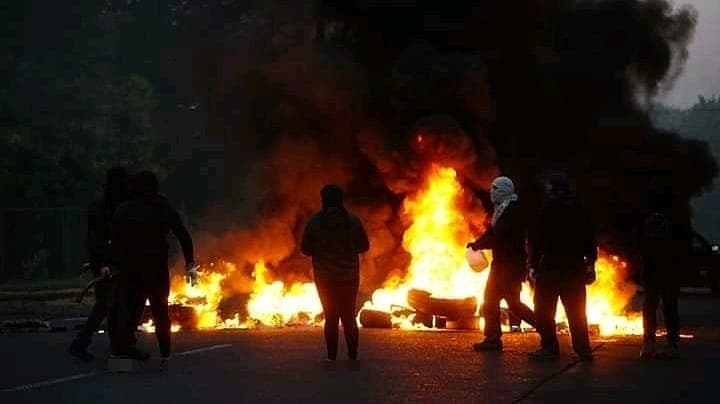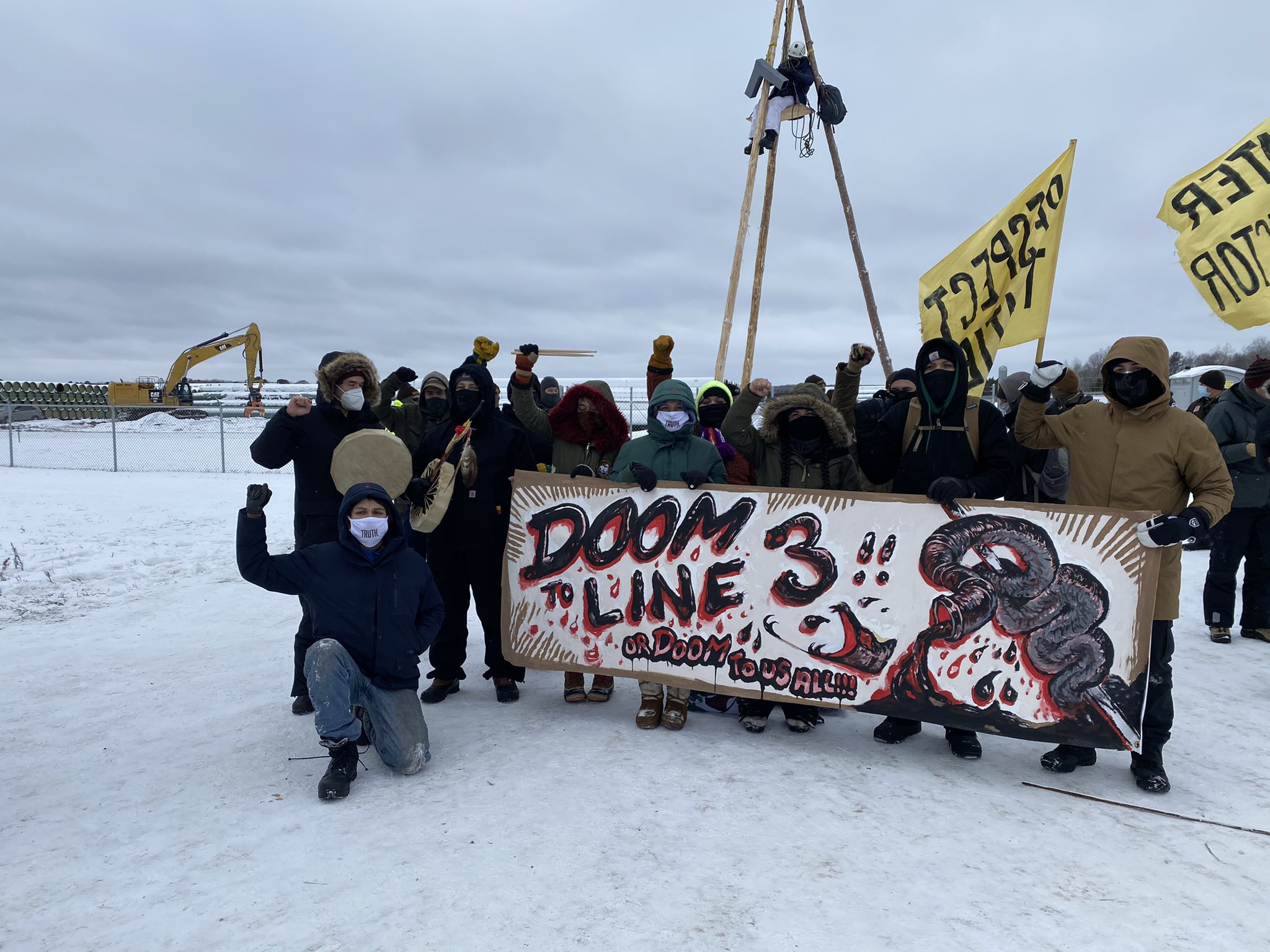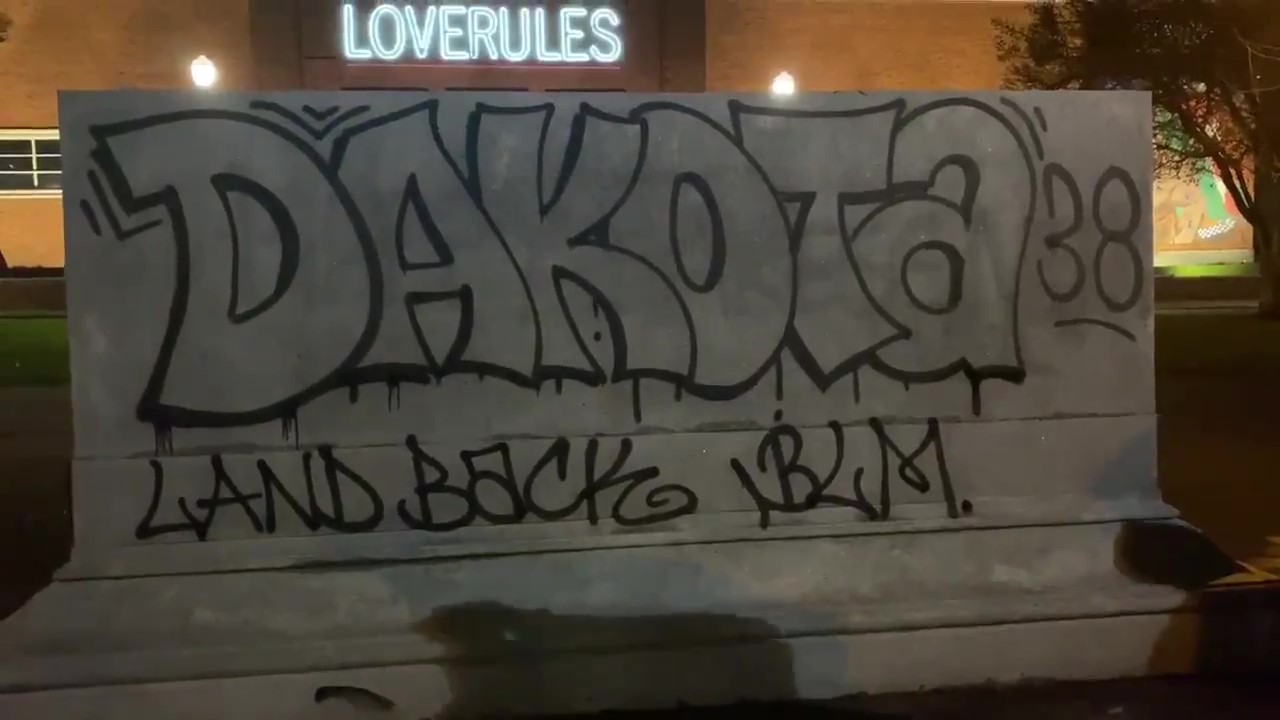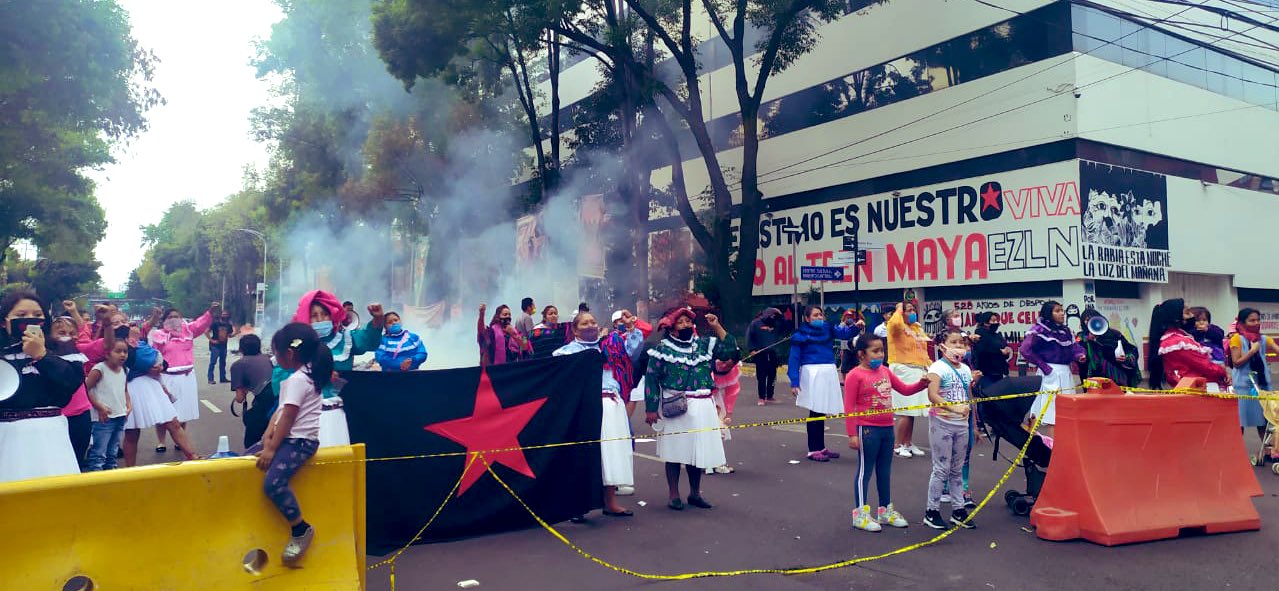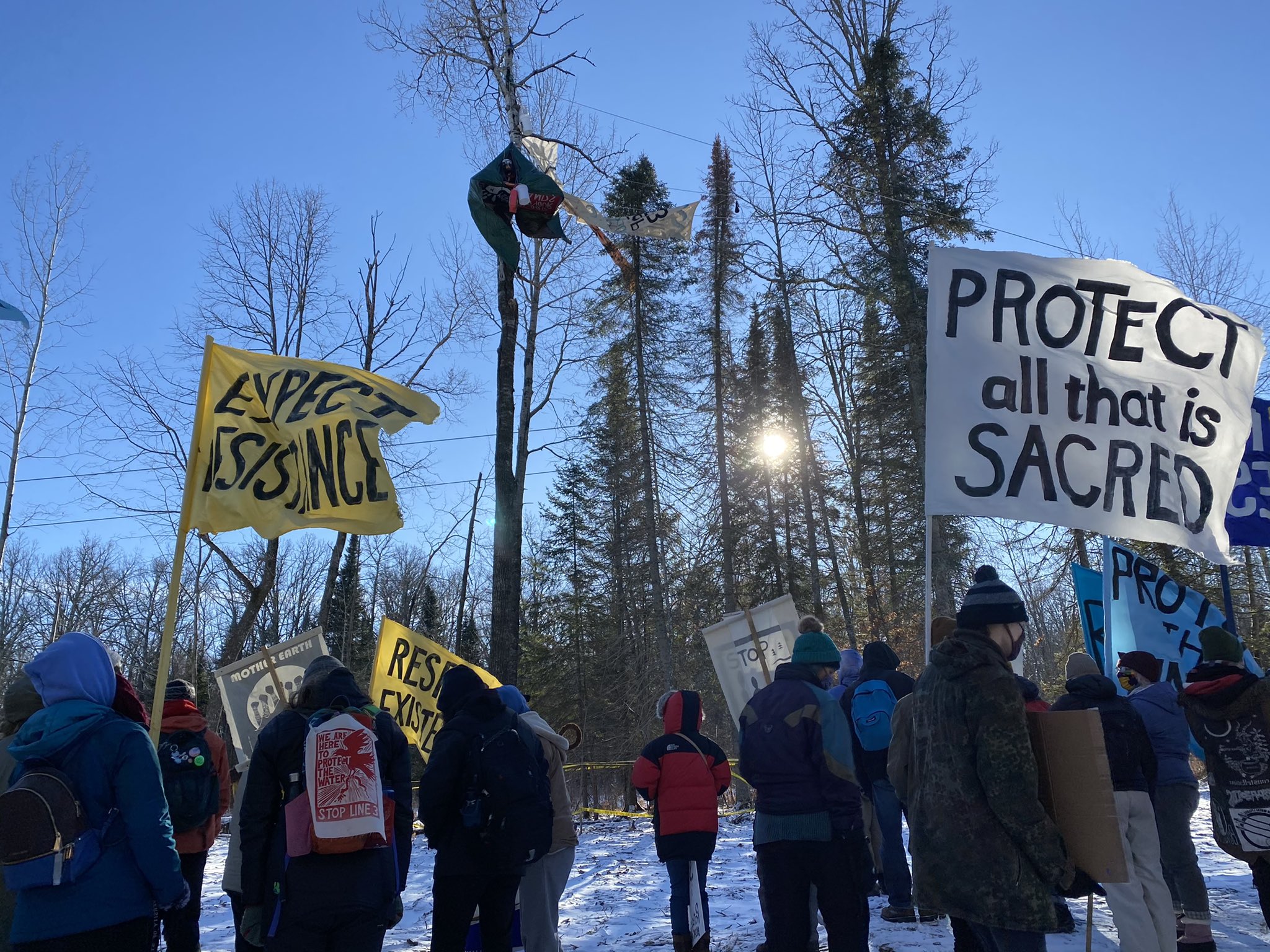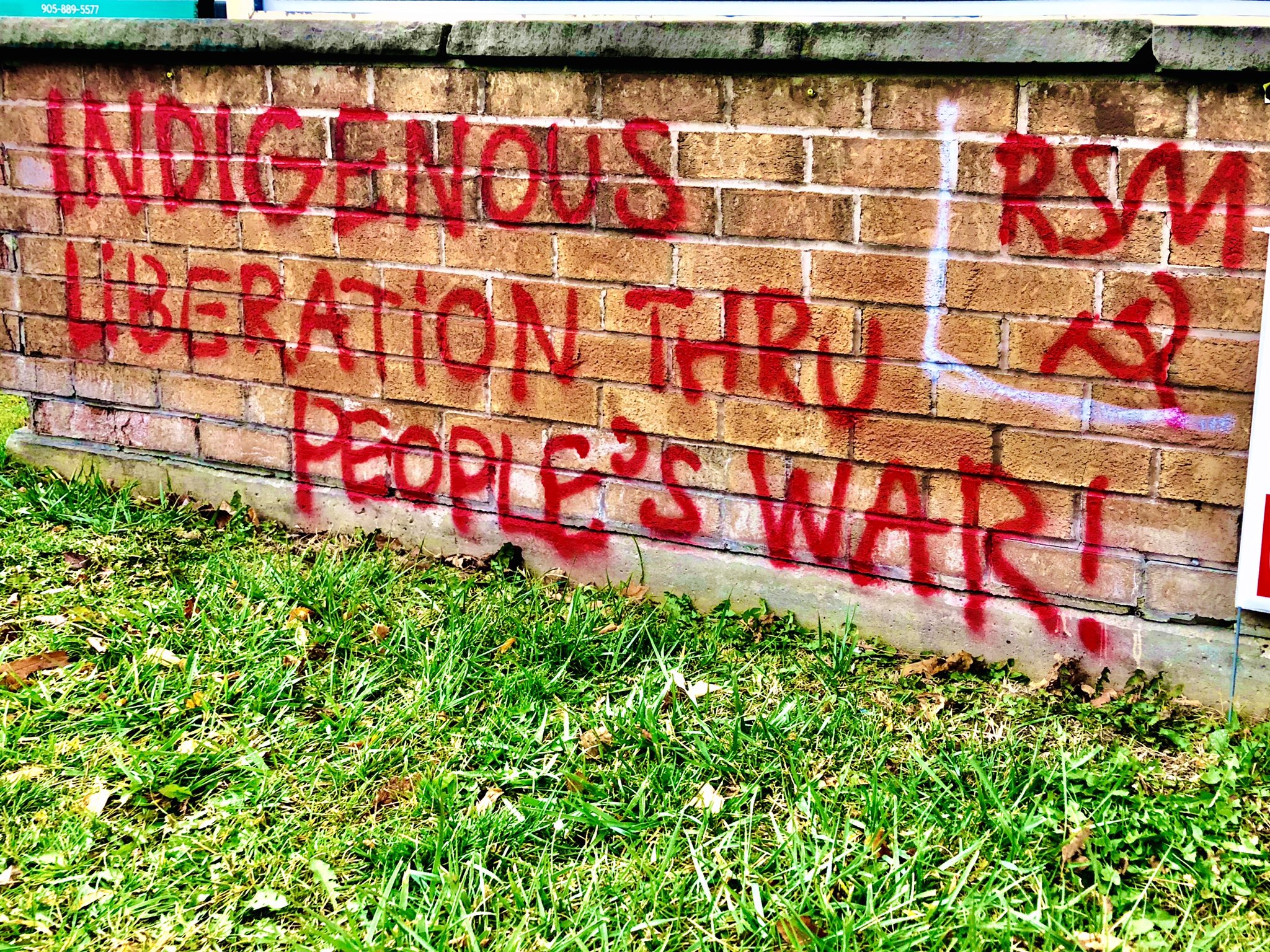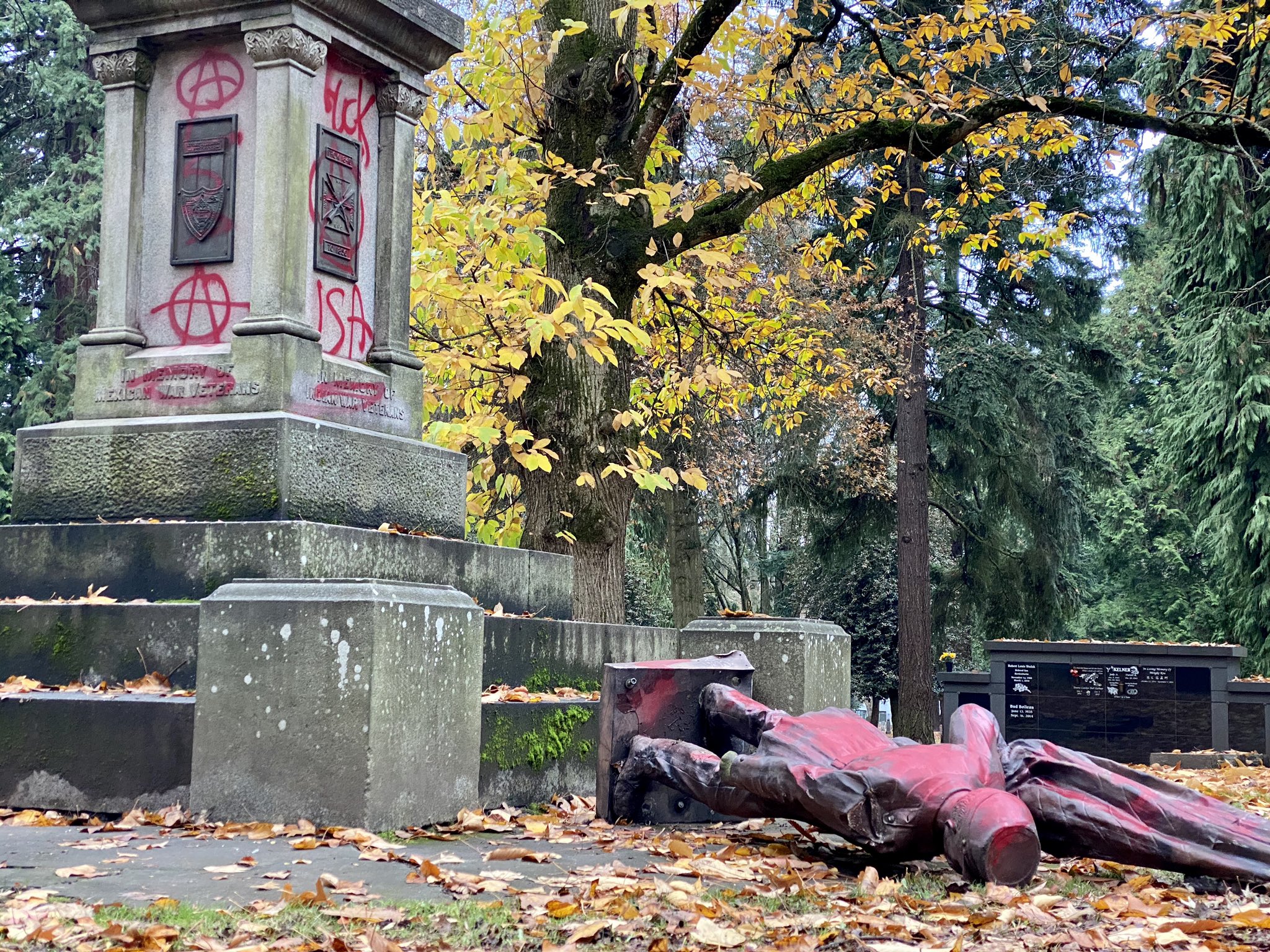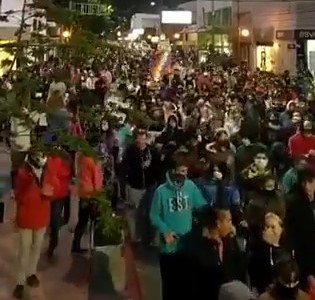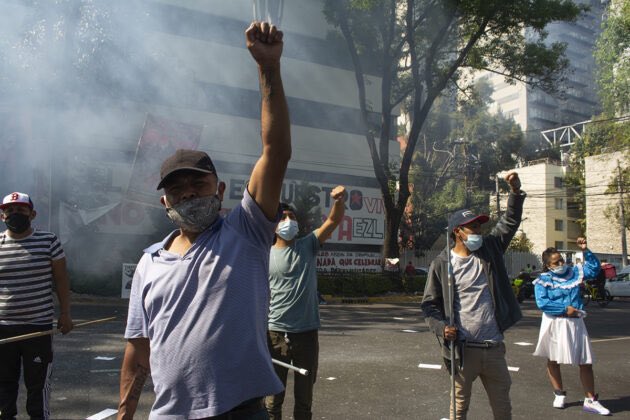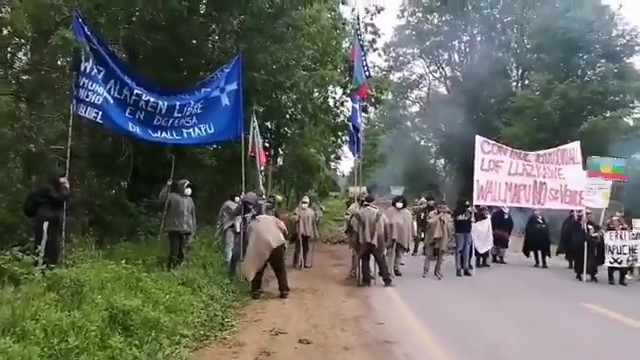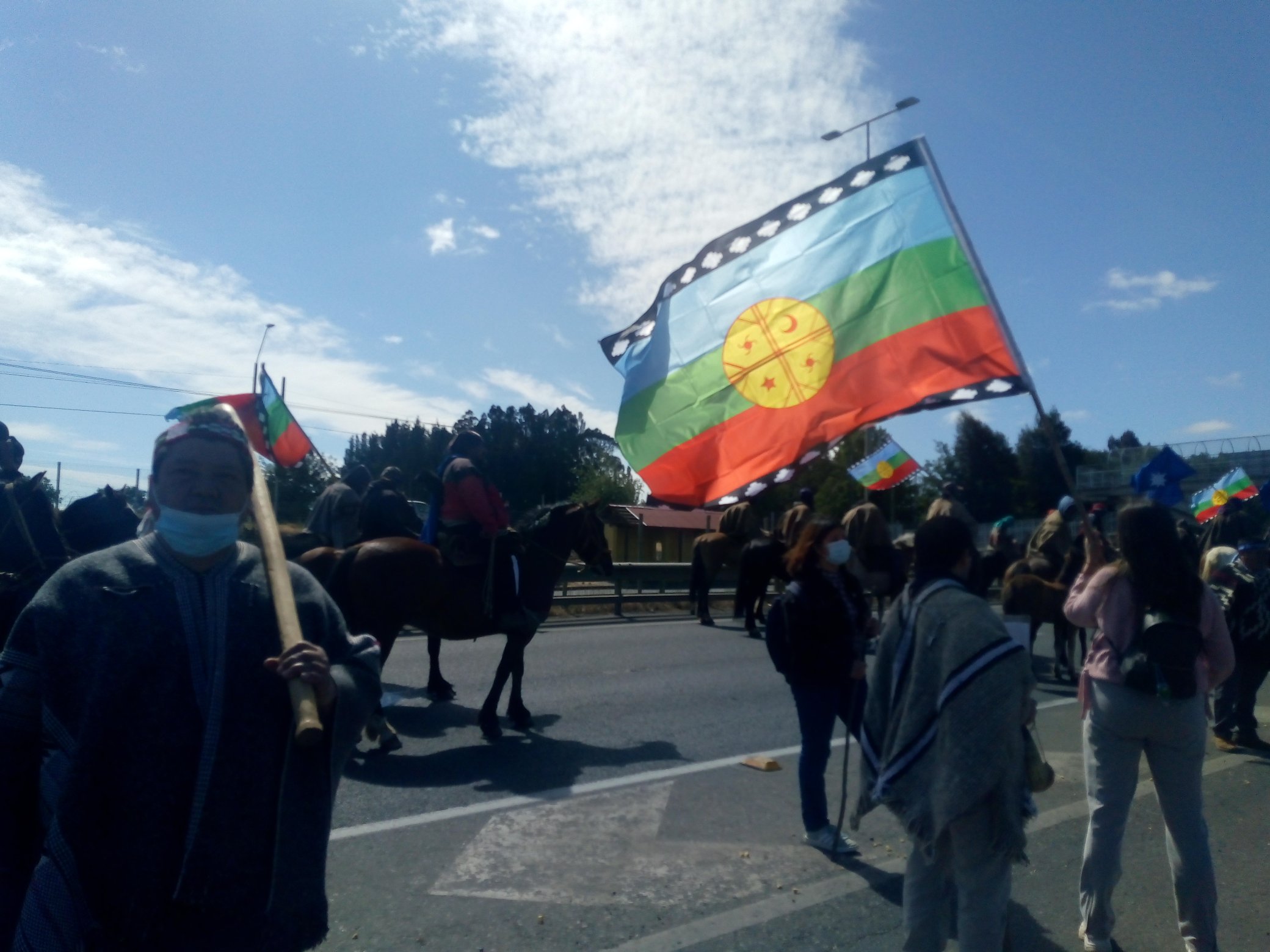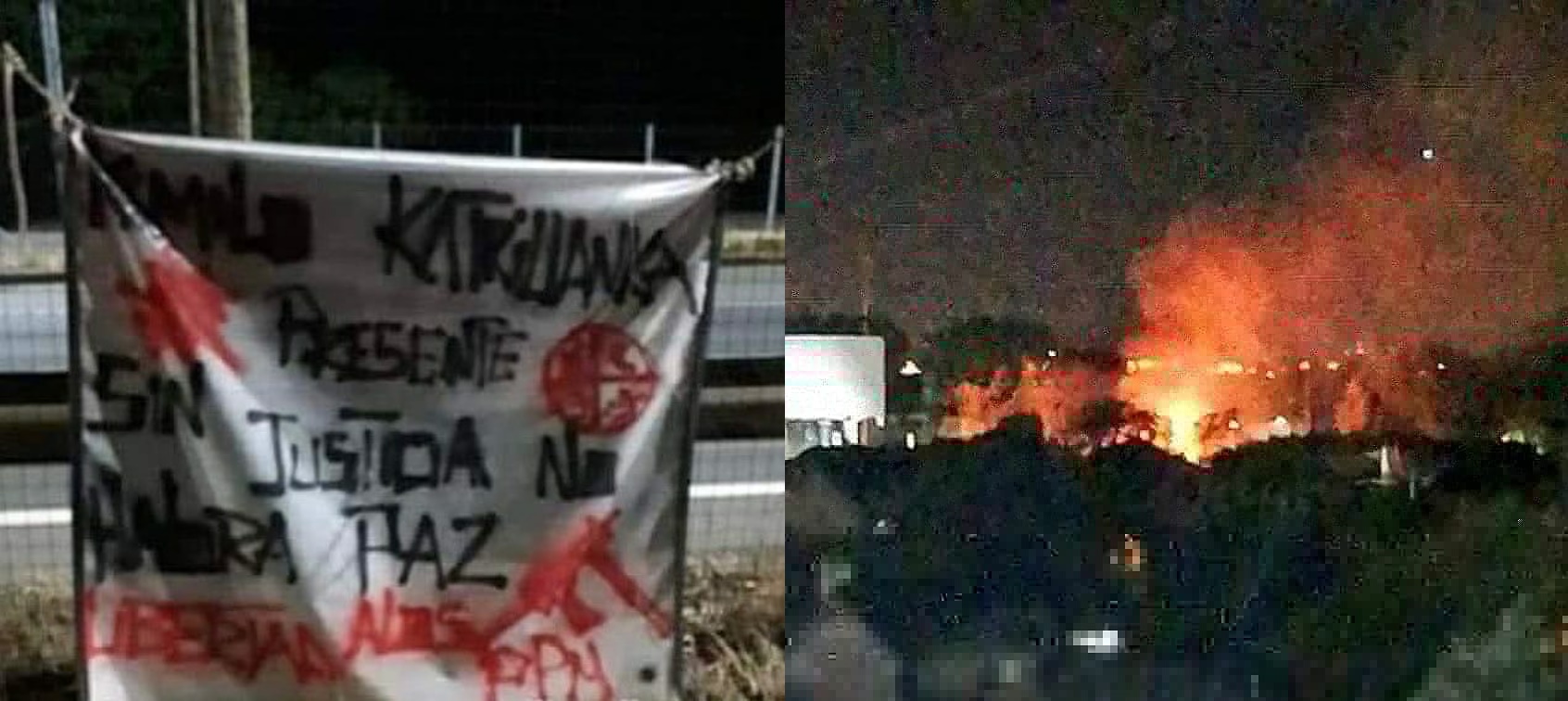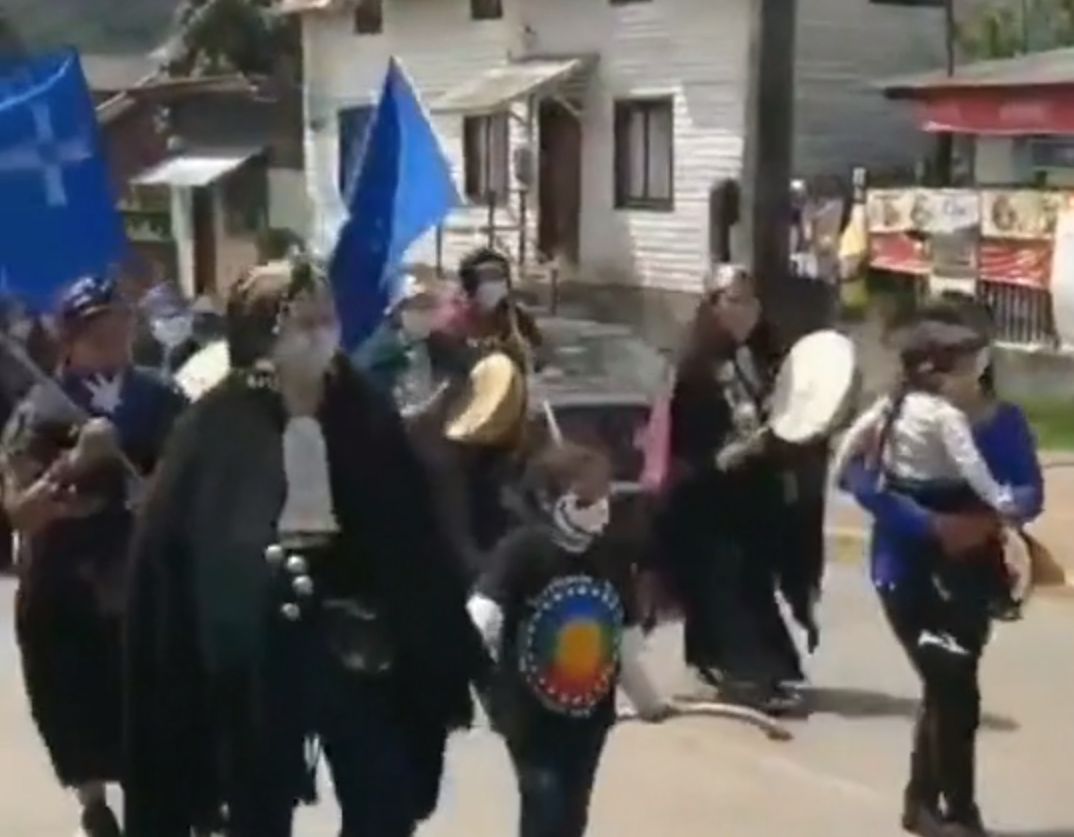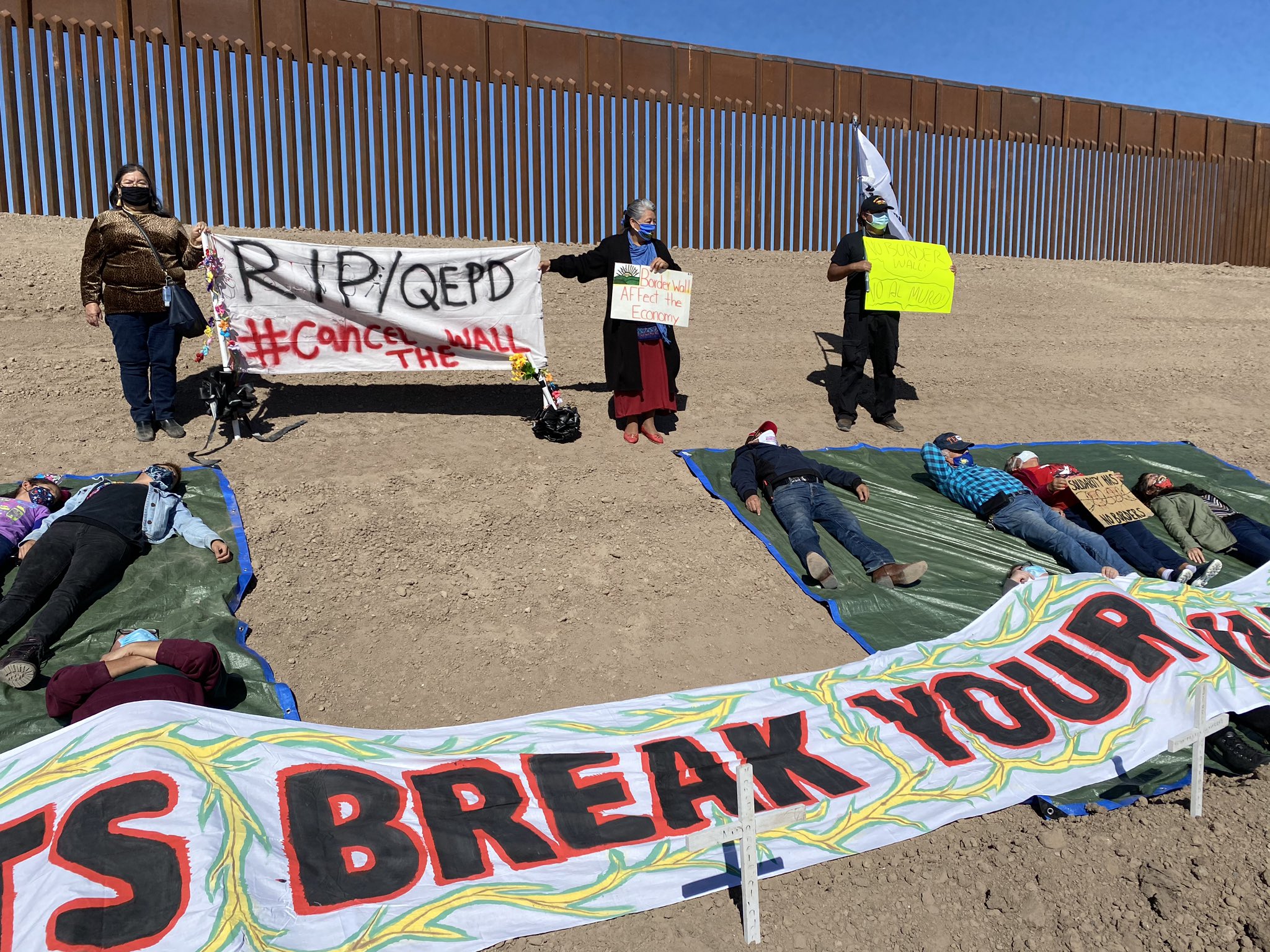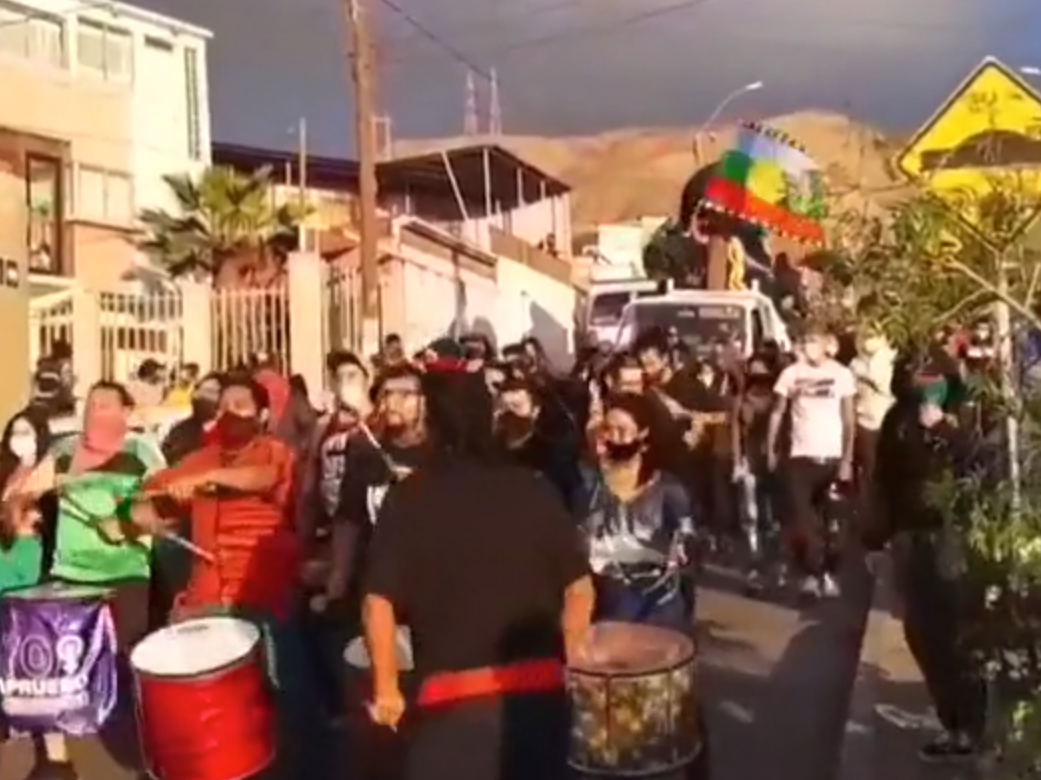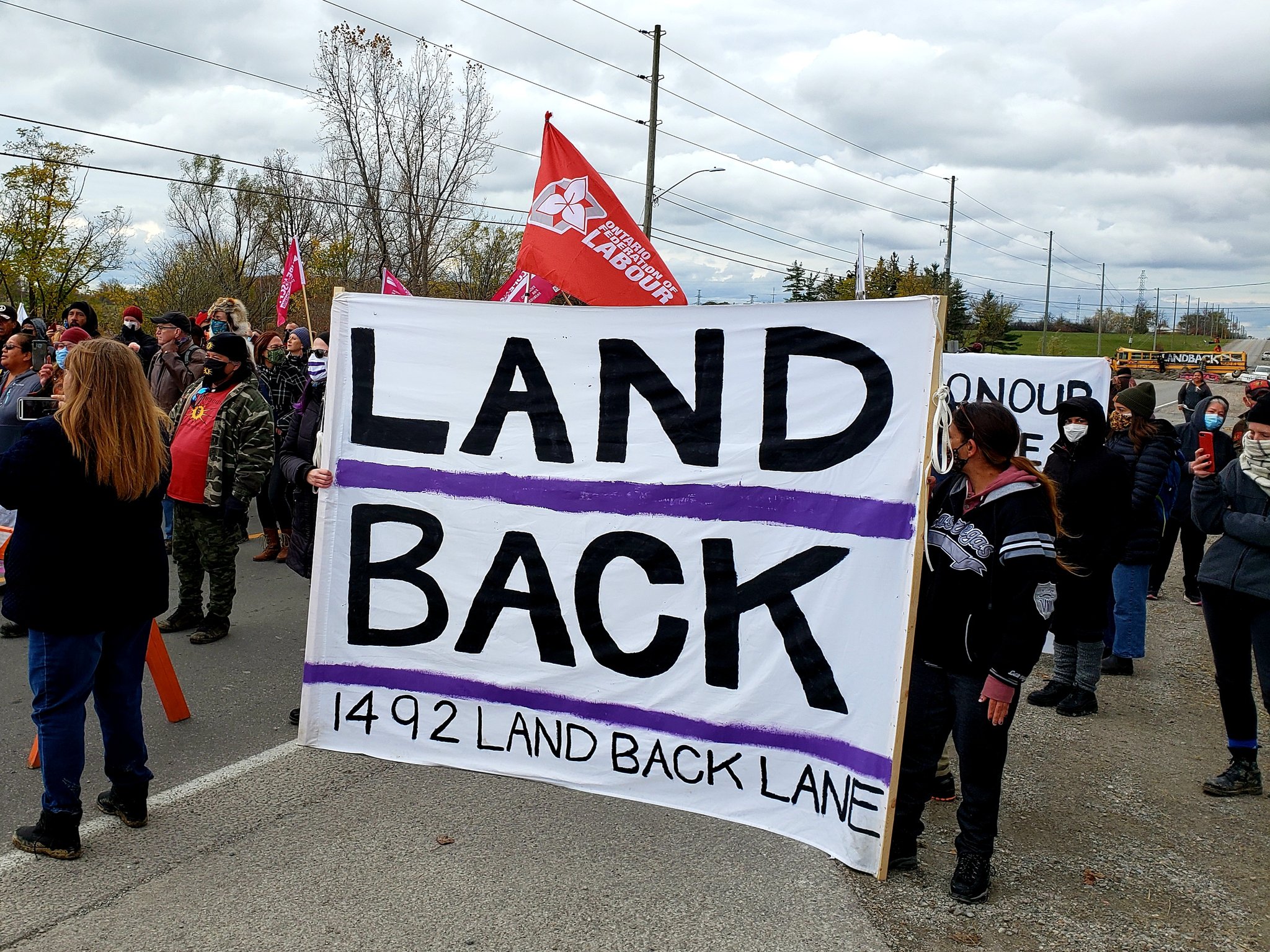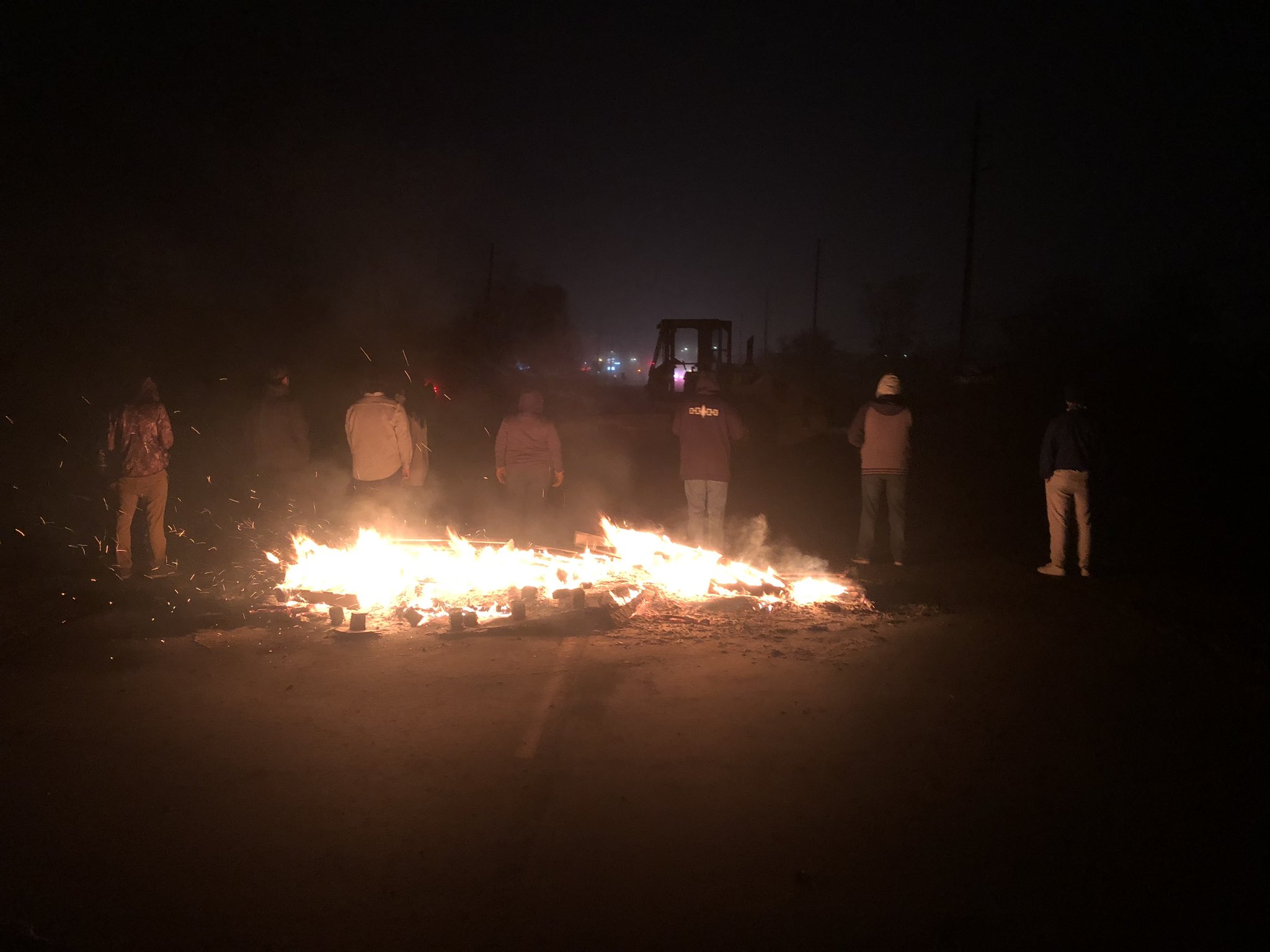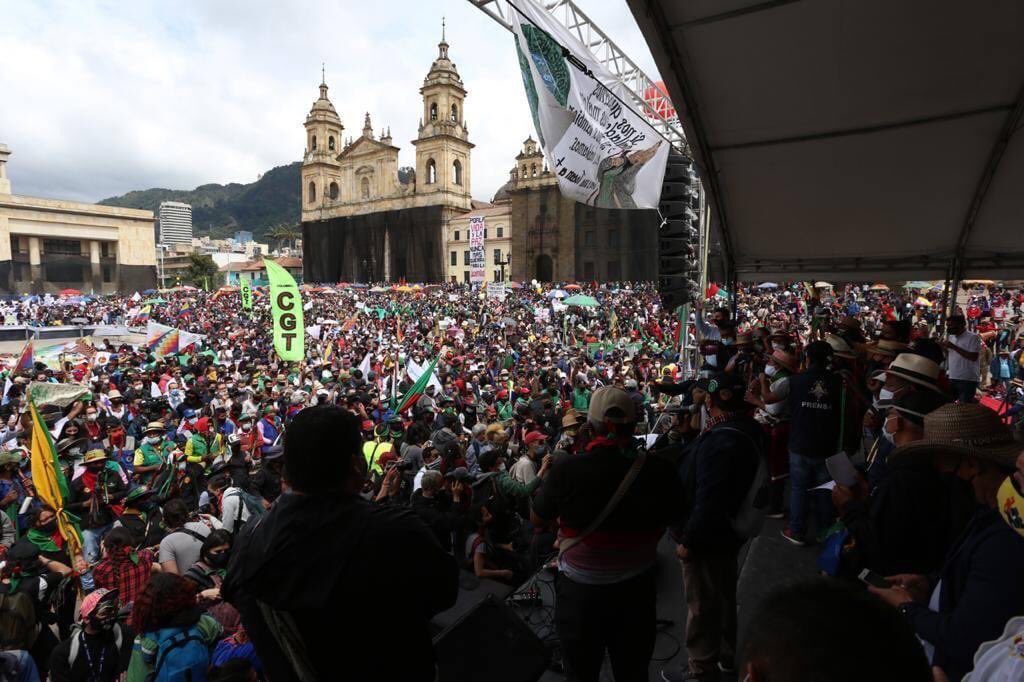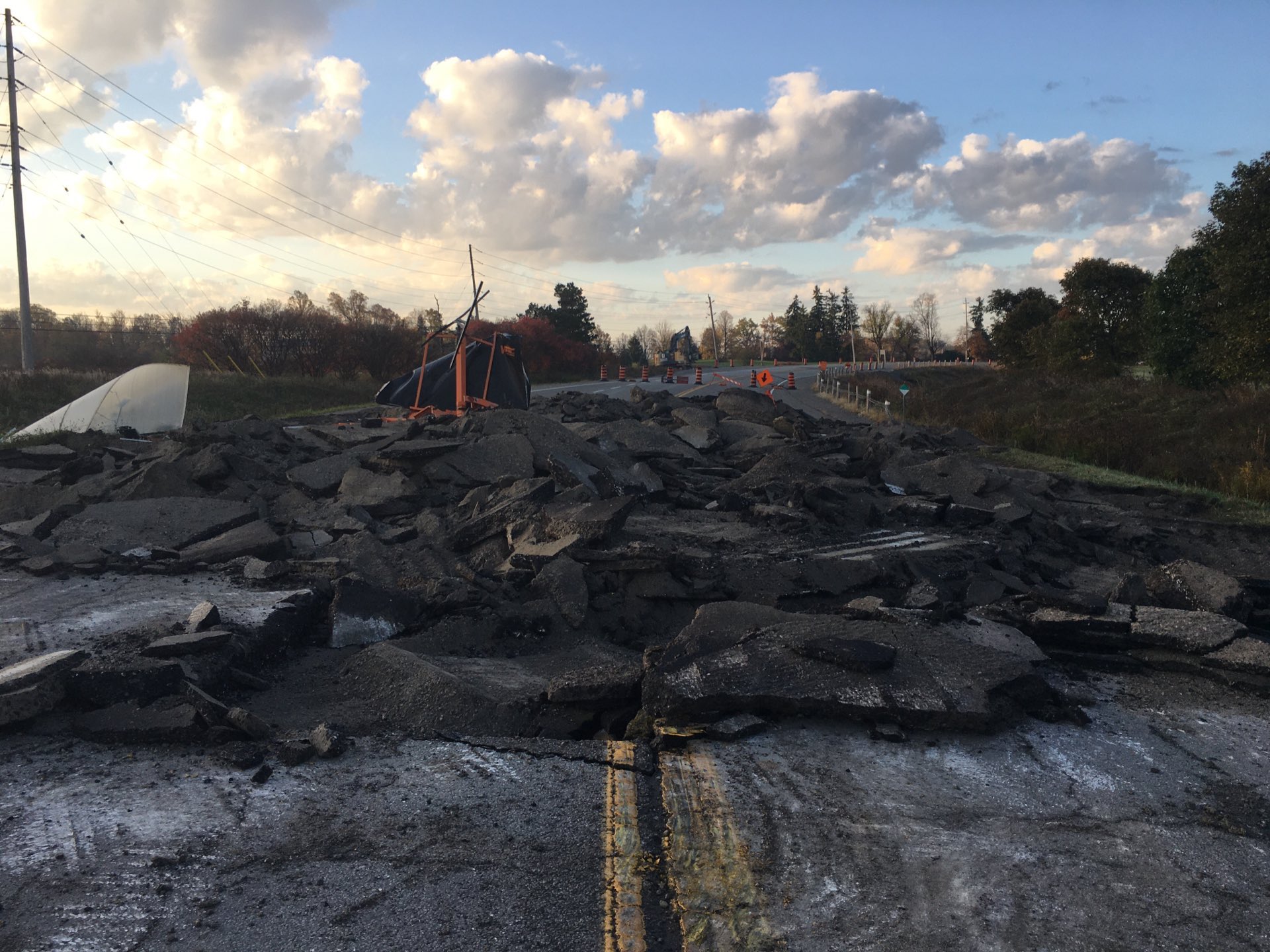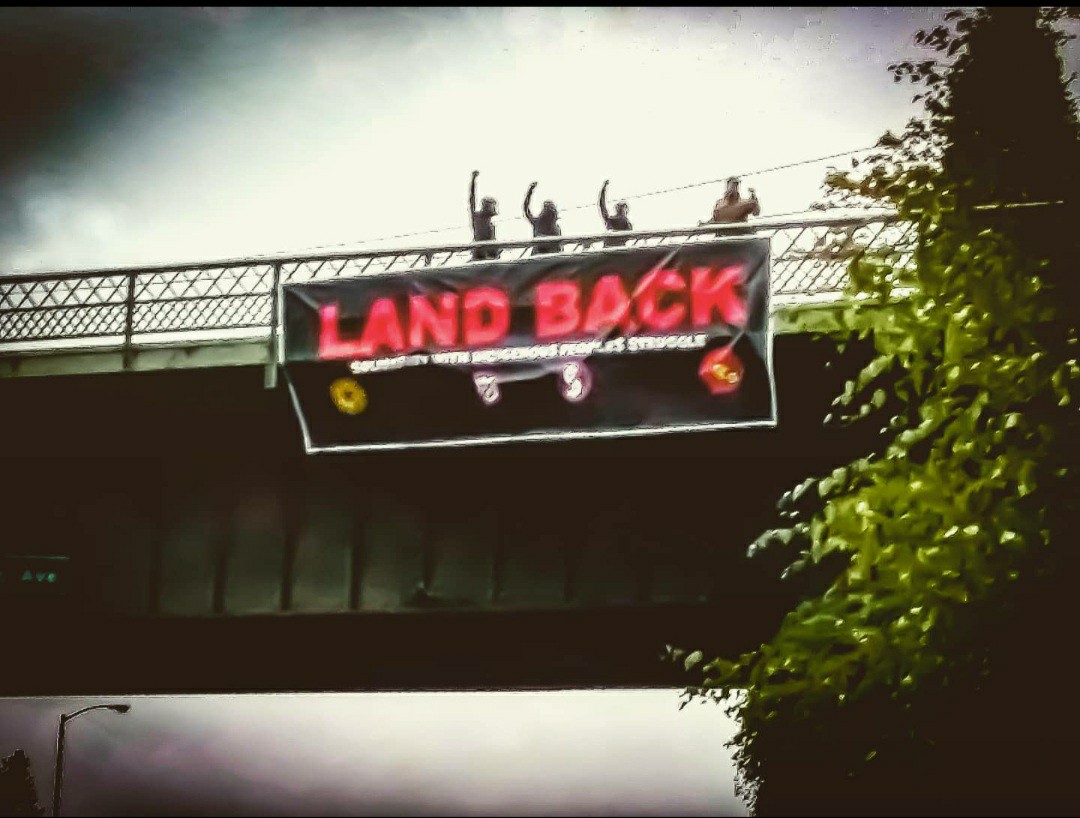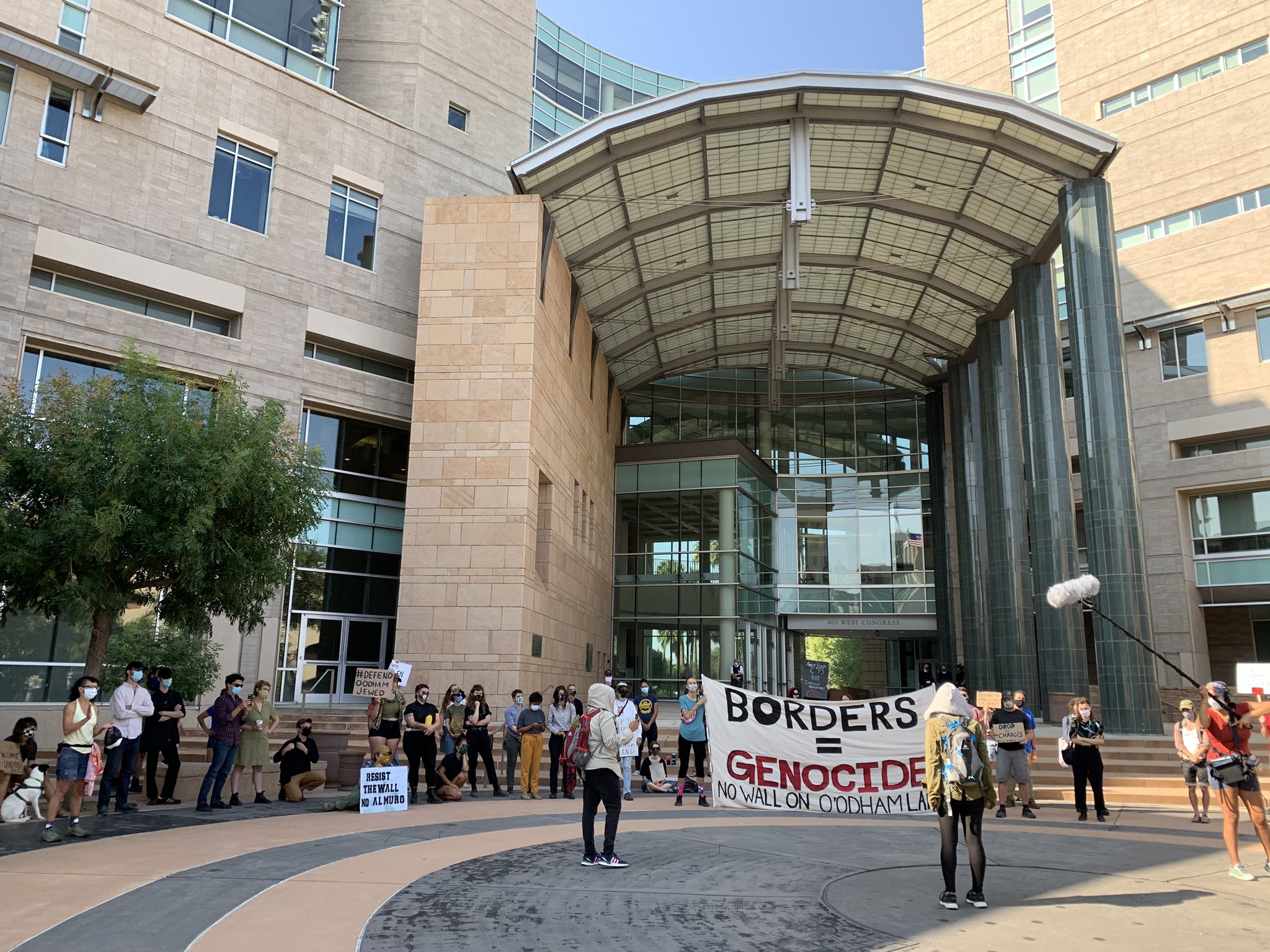Mt. Rushmore/Keystone Protest Flag of the Lakotah and their allies. The Mt. Rushmore/Keystone protests occurred in tandem with President Trump’s rally at Mt. Rushmore for the 4th of July.
In the 1920s, South Dakota historian Doane Robinson hired sculptor Gutzon Borglum to construct a national monument to promote tourism in the state. Gutzon was a member of the Ku Klux Klan, and had recently helped construct a memorial to Confederate leaders in the state of Georgia. Some of the funding for the Mount Rushmore project came from the KKK.
The mountain that was chosen for the site of the monument is known as “The Six Grandfathers” (Thuŋkášila Šákpe) by Lakota peoples, named after the Earth, the Sky, and the four directions. The nine tribes of the Great Sioux Nation never agreed to or signed away their rights to this land; the Fort Laramie treaty in 1868, which the tribes did sign, guaranteed them “undisturbed use and occupation” of the land on which the Six Grandfathers, or Mount Rushmore, is on.
VIDEO
Dakota Access Pipeline Protests Map of the Dakota Access Pipeline with reference to indigenous reservations. The Dakota Access Pipeline was first given the go-ahead under the Obama administration, which would go through a sacred area of the Standing Rock reservation, where indigenous people would take out water and bury the dead in a sacred area. This was met with many protests, and Obama stopped it in 2016. Trump, after taking office, resumed the project and it was completed in 2017, despite marches on the white house and many other demonstrations throughout the country. But, Federal Judge James E Boasberg, sitting at the District Court for the District of Columbia, ruled that the construction of the pipeline had fallen short of environmental standards. It is to be shut down for 13 months until it can be revised to meet environmental standards, reviewed by a team of environmental experts and the United States military.
Highway 6 Blockade
The Six Nations blockaded Highway 6 in the Toronto area as retaliation to an attack by the Canadian Police.
Updates
August 7, 2021
Hundreds of insurgents and protesters across the indigenous region of Araucania in Chile carried out sabotage actions and demonstrations against…
Read More
July 30, 2021
Thousands of protesters across Chile returned to the streets of multiple cities in support of the political prisoners of the…
Read More
July 29, 2021
Thousands of protesters took to the streets across Chile in support of the prisoners of the social war in Chile,…
Read More
July 22, 2021
Clashes continued between Chilean government forces and indigenous insurgents in the region of Araucania, with Mapuche groups reclaiming ancestral land…
Read More
July 15, 2021
Dozens of protesters gathered in Santiago in support of Mapuche & anarchist political prisoners of the social war and the…
Read More
July 13, 2021
Around 4000 people arrived in Lumako for the Eluwün (funeral) of Mapuche chief Pablo Marchant, killed by police during clashes…
Read More
July 12, 2021
Dozens of protesters in Antofagasta took to the streets, tagging graffiti, blocking roads, and burning barricades in solidarity with Mapuche…
Read More
July 11, 2021
Dozens of protesters and insurgents continued to mobilize and carry out operations for a 3rd day, setting up roadblocks and…
Read More
July 10, 2021
Hundreds of protesters in Santiago gathered in condemnation of the police killing of Mapuche chief Pablo Marchant during a sabotage…
Read More
July 10, 2021
Clashes across the indigenous region of Araucania continued after the police killing of Mapuche chief Pablo Marchant during a sabotage…
Read More
July 9, 2021
Clashes occurred between insurgents and Chilean government forces across the indigenous region of Araucania after the killing of Mapuche chief…
Read More
July 9, 2021
Hundreds of protesters in Santiago gathered for a round of demonstrations in support of Mapuche & anarchist political prisoners of…
Read More
July 8, 2021
Strong clashes occurred in the town of Cañete during a demonstration in support of Mapuche political prisoner Oscar Pilquiman, an…
Read More
July 6, 2021
Thousands of protesters gathered at a vigil in the Santiago neighborhood of Villa Francia in memory of the recently deceased…
Read More
July 4, 2021
Over 100 protesters in Antofagasta took to the streets to demand the release of the political prisoners of the Mapuche…
Read More
June 17, 2021
Dozens of anarchists and protesters in Antofagasta took to the streets, blocking roads and burning barricades in solidarity with prisoners…
Read More
June 11, 2021
Dozens of anarchists and protesters in Santiago took to the streets in support of political prisoners of the 18th of…
Read More
June 10, 2021
Deforestation equipment in Angol, a town in the area of Araucania, was sabotaged in support of Mapuche sovereignty and autonomy,…
Read More
May 1, 2021
Thousands of protesters took to the streets of Medellín for a 4th consecutive day, as part of a general strike…
Read More
April 30, 2021
Thousands of protesters took to the streets across Cali, demanding the immediate withdrawal of the Tributary Reform in Colombia, which…
Read More
April 29, 2021
Tens of thousands of protesters returned to the streets of Cali for a 2nd consecutive day, as part of a…
Read More
April 29, 2021
Thousands of protesters in the city of Pasto took to the streets for a 2nd consecutive day as part of…
Read More
April 28, 2021
Tens of thousands of protesters in Bogota took to the streets in opposition to neoliberalism and an increase in taxes…
Read More
April 28, 2021
Tens of thousands of protesters took to the streets of Cali on the first day of a general strike against…
Read More
April 27, 2021
Indigenous activists near Friere, a town in the Araucanía region of Chile, sabotaged deforestation machinery in ancestral Mapuche land, setting fire…
Read More
March 12, 2021
Hundreds of protesters in Santiago took to the streets for a round of demonstrations to demand the release of all…
Read More
March 11, 2021
Around 100 protesters in Portland marched to demand the halt of the Line 3 Tar Sands pipeline in Minnesota, which…
Read More
March 10, 2021
Mapuche indigenous militants placed barricades on the Cunco-Huichahue Route in the Araucania region in opposition of the militarization of Wallmapu,…
Read More
March 9, 2021
Hundreds of members of the indigenous Mbya Guaraní community marched in Caaguazú to demand the resignation of president Marito Abdo,…
Read More
March 5, 2021
Over 20,000 Palestinian citizens of Israel took to the streets of Umm al-Fahm in opposition to discriminatory police brutality against…
Read More
February 23, 2021
Hundreds of protesters in the Iranian majority-Sunni and Baloch town of Saravan set the governors’ building and several police cars…
Read More
February 22, 2021
Tens of thousands of protesters returned to the streets across Algeria on the 2nd anniversary of the national Hirak movement’s…
Read More
February 22, 2021
Thousands of West Papuans marched in Dogiyai against the formation of a Central Papua Province and the building of a…
Read More
February 16, 2021
Thousands of Algerians returned to the streets of Kherrata on the 2nd anniversary of the birth of the Hirak movement,…
Read More
February 16, 2021
Members of the Lafkenche community belonging to Mapuche indigenous ethnic group in Chile burned barricades and protested in the Los…
Read More
February 9, 2021
Dozens of Portland protesters gathered for an indigenous-led march in solidarity with the Standing Rock Youth 93 mile run in…
Read More
February 6, 2021
Around 100 protesters in Portland gathered for an Abolish ICE protest in front of the local ICE facility in the…
Read More
February 6, 2021
Hundreds of Palestinians marched in the city of Tamra to protest the apartheid regime established by the Israeli state, which…
Read More
February 5, 2021
Hundreds of protesters took to the streets of Panguipulli in response to the police murder of Francisco Martínez, also known…
Read More
February 5, 2021
Dozens of protesters in Portland gathered for a press conference held by indigenous protesters, who recounted their experiences with police…
Read More
February 3, 2021
Armed Mapuche weichafe (warriors) seized the Route P-70 highway at the Lleu Lleu bridge near the towns of Cañete &…
Read More
January 30, 2021
Dozens of protesters in Seattle gathered for the Dexmaamxsgism Da Libaalx indigenous-led march for justice for black lives and all…
Read More
January 29, 2021
Dozens of protesters clashed with Carabineros in the central coastal city of Valparaíso in Chile, during a demonstration on the…
Read More
January 29, 2021
Hundreds of protesters took to the streets of Santiago during a mobilization on the anniversary of the police murders of…
Read More
January 29, 2021
Dozens of protesters gathered outside of the Center of Justice in Santiago in support of Mauricio Cheque, a Mapuche political…
Read More
January 23, 2021
Dozens of protesters gathered in Seattle for an indigenous-led march to demand the abolition of ICE and stop all deportations…
Read More
January 15, 2021
Hundreds of protesters gathered in Plaza Dignidad for a national mobilization demanding the release of political prisoners. Intense clashes occurred…
Read More
January 11, 2021
Protesters in Santiago placed barricades along the memorial of Villa Francia on Curacaví street, demanding the end of state terror…
Read More
January 9, 2021
Thousands of Kurds took to the streets in Paris, demanding justice on the 18th anniversary of the triple murders of…
Read More
January 9, 2021
Indigenous activists and allies gathered near Palisade, Minnesota, to protest against the Line 3 Tar Sands Pipeline, marching down the…
Read More
January 9, 2021
Hundreds of protesters gathered for a People’s March near the Minnesota governor’s mansion in St. Paul, demanding “Cash not covid”,…
Read More
January 8, 2021
Hundreds of Chileans gathered in Antofagasta to demand the immediate release of all political prisoners of the 18th of October…
Read More
January 8, 2021
Hundreds of Chileans gathered in Santiago to protest against state terror perpetrated on Mapuche indigenous communities, after the family of…
Read More
January 7, 2021
Chilean protesters placed barricades on the 810th Kilometer of Route 5 in Mafil, in support of the Mapuche communities of…
Read More
January 4, 2021
Dozens of Chilean activists and street medics gathered at Plaza Dignidad in Santiago to protest for amnesty for all political…
Read More
January 4, 2021
Thousands of Palestinian activists and demonstrators protested against Israeli settlement expansions in Halhoul and Ramallah, and were assaulted heavily by…
Read More
January 3, 2021
Protesters in Temuco placed barricades in solidarity with Matias Catrileo, a young Mapuche warrior/weychafe murdered by police on January 3rd,…
Read More
December 28, 2020
Protesters returned to the Line 3 Tar Sands pipeline blockade in Minnesota after a protester was arrested for stopping construction…
Read More
December 26, 2020
Dozens of protesters gathered in Portland on the anniversary of the public execution of 38 Dakota men in Mankato by…
Read More
December 22, 2020
Hundreds of activists across Portland dropped dozens of banners in the city, as part of a new campaign labeled as…
Read More
December 17, 2020
Police arrested 9 indigenous Otomi occupiers of the National Institute of Indigenous Peoples, shortly after the government agreed to take…
Read More
December 14, 2020
After months of resistance to stop the Line 3 pipeline expansion, a total of 17 water protectors, mostly belonging to…
Read More
December 9, 2020
Hundreds of protesters in the 98% indigenous Totonicapán department in Guatemala from the K’iche ethnicity began a national blockade of…
Read More
December 9, 2020
Land defenders of the Red House Eviction Defense continued to build up their barricades and defenses, placing political slogans and…
Read More
November 27, 2020
About 50 demonstrators at Capitol Hill in Seattle gathered to protest against Thanksgiving, smashing up a Starbucks and spray-painting slogans…
Read More
November 27, 2020
Banners were dropped by demonstrators across the United States in solidarity with Loren Reed, an indigenous Diné anarchist, who was…
Read More
November 26, 2020
Demonstrators in Toronto from the Revolutionary Student Movement answered the call for a National Week of Action from indigenous land…
Read More
November 26, 2020
Hundreds of indigenous and non-indigenous youth shut down the Yonge and Dundas roads in Ontario in solidarity with the Wet’swet’en…
Read More
November 26, 2020
Demonstrators all over Southeast Portland spray-painted slogans and defaced statues of colonialism, including many large businesses. A war monument was…
Read More
November 26, 2020
Indigenous Wampanoag people and their allies gathered in Plymouth, Massachusetts, for the 50th annual National Day of Mourning march against…
Read More
November 24, 2020
Hundreds of demonstrators gathered in Esquel and Trelew, 2 towns in Chubut province, against a mega-mining operation in the area…
Read More
November 24, 2020
Members of the Otomi indigenous central Mexican group occupied the National Institute of Indigenous Peoples and burnt files and furniture…
Read More
November 23, 2020
Dozens of indigenous Mapuche people gathered in the Interlagos sector highway in Panguipulli, Chile, for traditional land back, peacefully occupying…
Read More
November 21, 2020
Tens of thousands of protesters demonstrated across Guatemala against government corruption and a budget plan that took away from the…
Read More
November 15, 2020
Demonstrators gathered in central Madrid to condemn rampant racism, of which the country has been reminded on the recent anniversary…
Read More
November 14, 2020
Demonstrators and allies across Chile commemorated the 2-year anniversary of the murder of Camilo Catrillanca, a Mapuche farmer, at the…
Read More
November 13, 2020
Masked insurgents in Wallmapu, near Chamichaco, engaged in a gunfight with Winka (non-Mapuche) police, with several banner drops occurring and…
Read More
November 11, 2020
Mapuche people in Panguipulli demonstrated against the construction of several dams in Mafil, of Los Lagos stating that the government…
Read More
October 29, 2020
Protesters demonstrated against the arrival of the Secretary of Homeland Security in the Rio Grande Valley in southern Texas to…
Read More
October 28, 2020
Protesters in Antofagasta took to the streets demanding the resignation of President Piñera and the government representation in the constitutional…
Read More
October 25, 2020
The Ontario Federation of Labor, encompassing over 1 million workers, marched in solidarity with 1492 Land Back Lane, condemning the…
Read More
October 24, 2020
Protesters took to the streets for the 4-year anniversary of the murder of Renee Davis, an indigenous black woman. More…
Read More
October 23, 2020
Mapuche protesters took to the streets in the communities of Lof Juan Queupucura and Antonio Pichulman in the historically indigenous-majority…
Read More
October 22, 2020
Clashes continued to occur between the Onkwehonwe tribe and the OPP at 1492 Land Back Lane, with indigenous people hitting…
Read More
October 22, 2020
Protesters at the 1492 Land Back Lane camp clashed with the Ontario Provincial Police (OPP), with multiple roads blockaded and…
Read More
October 22, 2020
The Misak tribe is a tribe from Western Colombia (Cauca Department), which attended the Minga 2020 protests in which 150,000…
Read More
October 22, 2020
Tens of thousands of indigenous people once again occupied Plaza Bolivar in Bogota to protest massacres perpetrated by government-backed paramilitaries…
Read More
October 22, 2020
The protesters at the 1492 Land Back Lane camp destroyed a highway that was planned to go into virgin land…
Read More
October 12, 2020
Indigenous People’s Day protests were planned as part of a 3-consecutive day event involving 1492 Land Back Lane, the Indigenous…
Read More
October 11, 2020
https://protests.media/indigenous-day-of-rage-begins/ Portlanders took to the streets during the Indigenous Day of Rage on the 11th of October to protest the…
Read More
October 11, 2020
The Indigenous Day of Rage, a planned direct action across the Americas, took place on the 11th against decolonization and…
Read More
October 9, 2020
1492 Land Back Lane was a planned day of direct action on the 9th of October all across so-called Canada…
Read More
October 4, 2020
A protest took place in Minneapolis on the 4th of October against anti-indigenous activity by police and local fossil fuel…
Read More
September 20, 2020
Through the week of 13-20 September 2020, several activist groups belonging to the O’Odham and Kumeyaay indigenous tribes have been…
Read More
Table of ContentsMt. Rushmore/Keystone ProtestDakota Access Pipeline ProtestsHighway 6 BlockadeUpdates Mt. Rushmore/Keystone ProtestFlag of the Lakotah and their allies.The Mt. Rushmore/Keystone protests occurred in tandem with President Trump’s rally at...



